Channels
Special Offers & Promotions
Linkam Scientific Instruments Limited
Products
Contact Linkam Scientific Instruments Limited
All articles from Linkam Scientific Instruments Limited
Linkam partners with University of Huddersfield to spotlight new infrared heating stage at TAC 2025
Mar 26, 2025
Research explores new DSC-thermomicroscopy approach to reach new depths in material property analysis
Aug 31, 2022
Linkam launches new water circulation pump to optimise cooling of its temperature control stages
Nov 1, 2021
New research indicates hot-melt extrusion produces predictable, high drug loading amorphous solid dispersions
Aug 16, 2021
Linkam FDCS 196 stage used in research to develop a novel transdermal delivery system for risperidone
May 27, 2021
Linkam highlights solutions for characterising the thermal properties of materials at its first ArabLab
Feb 19, 2020
Linkam Reports on how Astra Zeneca Study the Effects of Changes in Humidity on the Development of new APIs
Apr 25, 2018
Linkam Reports on the Temperature-Controlled Microscopy Characterisation of Perovskite Materials for Photovoltaics
Feb 23, 2018
Linkam Launches the CMS196M for Enhanced Cryo-Correlative Microscopy with Greatly Improved Work Flow
Feb 8, 2017
Linkam Adds an Environmental Scientist in the Latest Expansion of Support Staff to Assist Users Worldwide
Sep 4, 2015
Linkam release the RH95 Relative Humidity Control unit for use in conjunction with Linkam
Jun 22, 2015
Linkam Stages Used to Study the Effects of Cryopreservation on the Quality of Koala spermatozoa Samples
May 15, 2015
Linkam and Xenocs Announce Products for X-ray Measurements Under Controlled Temperature and Tensile Conditions
Nov 13, 2014
Scientists at the University of Lille 1 are using the Linkam MDS600 stage for fluid inclusion studies
Sep 5, 2013
Scientists at the Geological Survey of Finland are using the MDSG600 stage for fluid inclusion microthermometry
Jun 20, 2013
South Africa's University of the Orange Free State use Linkam's THMS600 stage to study liquid crystals
Apr 11, 2013
Linkam Scientific Instruments reports on the launch of their new Cryo-Correlative Cooling Stage
Jan 4, 2013
Linkam Scientific temperature controlled warm stages chosen for sperm motility in human fertility testing
May 20, 2012
The Linkam TH60-6 warm stage is used at the Department of Ecology and Genetics, Uppsala University, Sweden
May 1, 2012
Linkam temperature controlled stage used in freeze drying characterization at the University of Iowa
Feb 29, 2012
Linkam tensile stage chosen to control stress in growth of human collagen by the University of Liverpool
Jun 8, 2011
Linkam temperature controlled tensile stage selected by the Mather Group to aid polymer characterization
Mar 29, 2011
Linkam and BTL 10-year partnership delivering optimum solutions in freeze drying technology
Mar 15, 2011
Linkam temperature stages chosen to characterize liquid crystal nanoparticle composites by the University of Manitoba
Jan 28, 2011
Queen's University in Canada selects Linkam temperature stages to characterize ferroelectric liquid crystals
Aug 11, 2010
Linkam supplies temperature stages to liquid crystal development and characterization specialists, LC-Vision
Jul 14, 2010
Media Partners


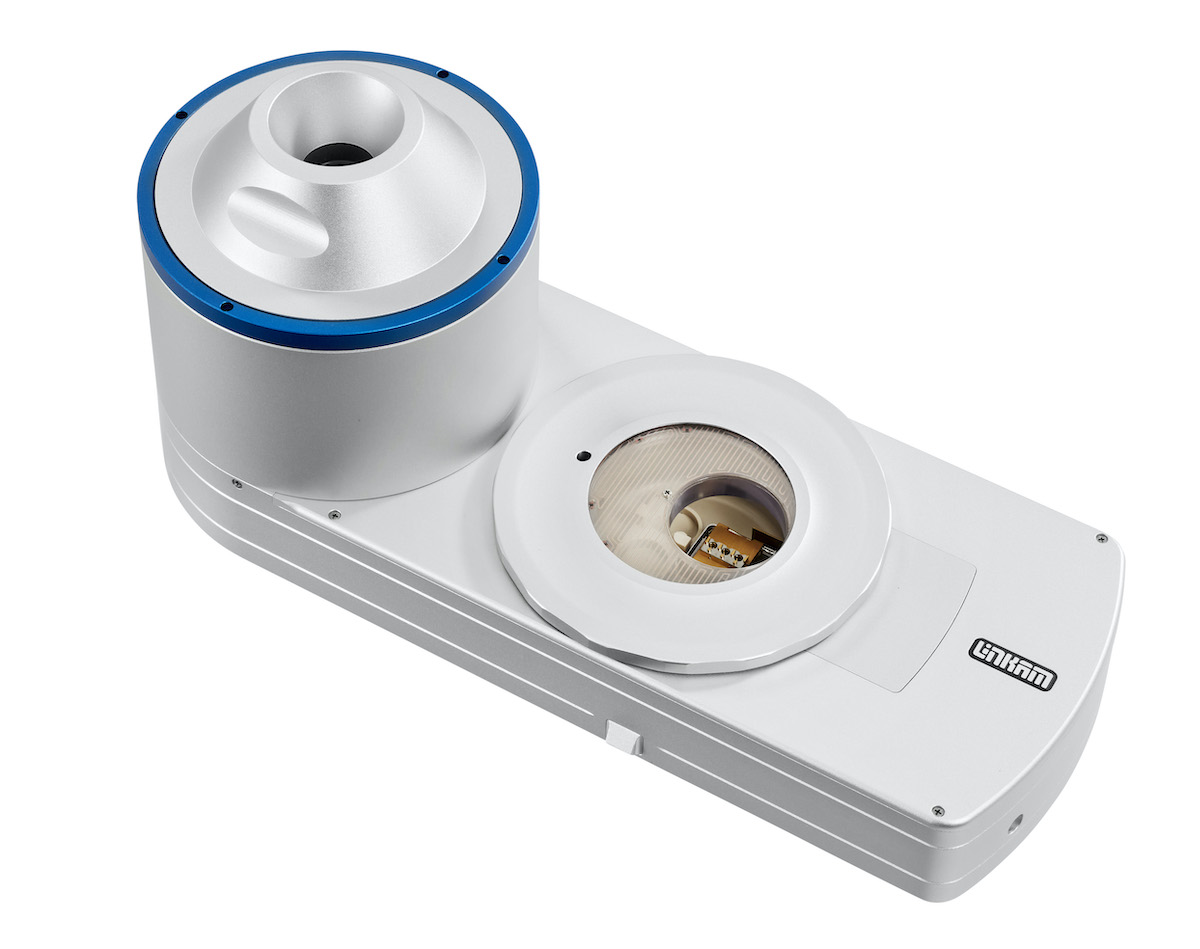 Market leader in temperature and environmental-controlled microscopy, Linkam Scientific Instruments, presented its cryobiology portfolio including the CMS196V4 stage and Modular Imaging Platform at this year’s CryOZ 2025. Linkam Scientific Instruments, represented by its Australian cryo-products distribution partner Hin Sci, is showcasing its range of cryogenic temperature systems, including its leading CMS196V4 cryo-CLEM stage at this year’s CryOZ conference...
Market leader in temperature and environmental-controlled microscopy, Linkam Scientific Instruments, presented its cryobiology portfolio including the CMS196V4 stage and Modular Imaging Platform at this year’s CryOZ 2025. Linkam Scientific Instruments, represented by its Australian cryo-products distribution partner Hin Sci, is showcasing its range of cryogenic temperature systems, including its leading CMS196V4 cryo-CLEM stage at this year’s CryOZ conference...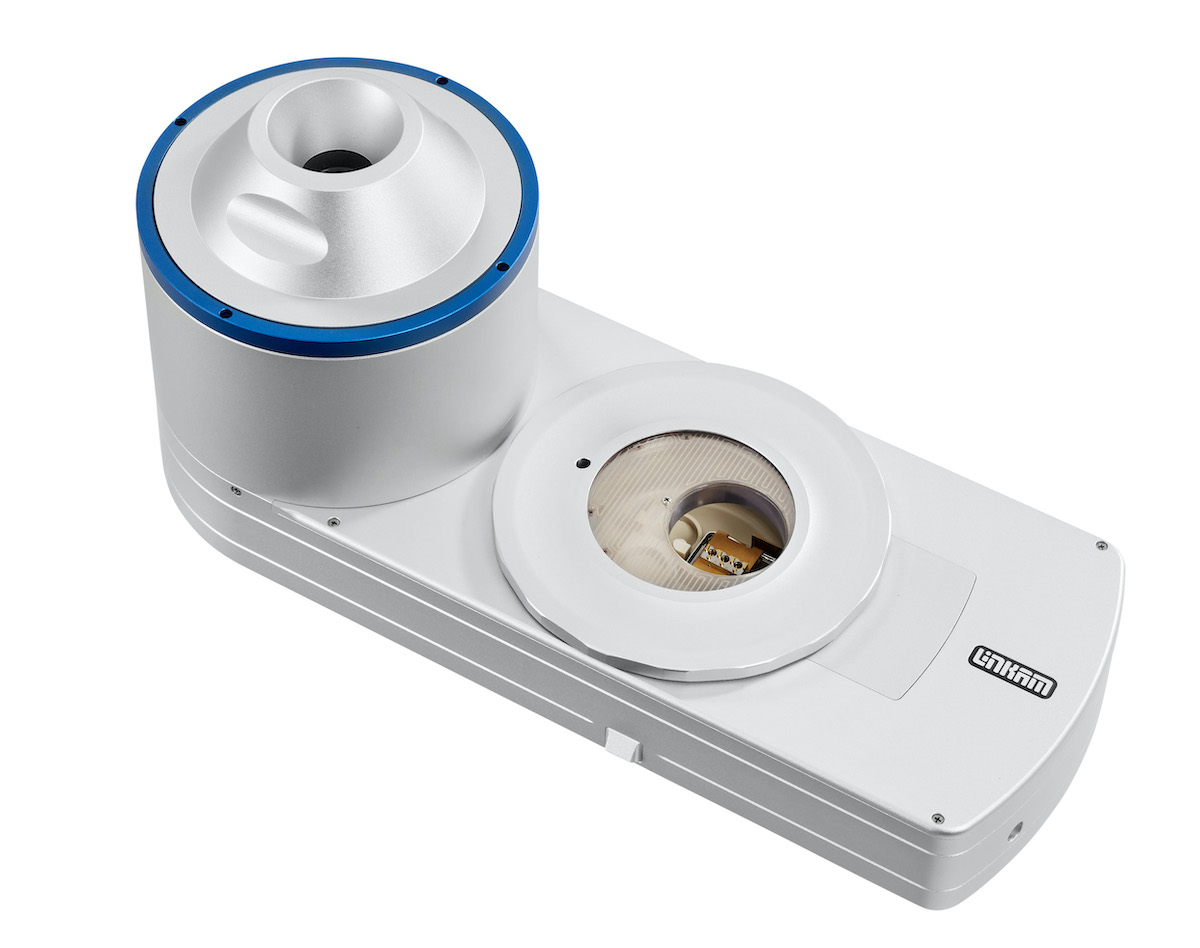 Linkam Scientific Instruments is showcasing a range of microscopy stages and instrumentation at this year’s M&M conference, including its core stages, new products, and its cryogenic temperature portfolio. Linkam’s showcase at M&M 2025 includes the new IHS1700 stage, an infrared heating system developed alongside researchers at the University of Huddersfield, UK, which has a temperature range of room temperature to 1700 °C and uses infrared heating to achieve a maximum 2000 °C/min...
Linkam Scientific Instruments is showcasing a range of microscopy stages and instrumentation at this year’s M&M conference, including its core stages, new products, and its cryogenic temperature portfolio. Linkam’s showcase at M&M 2025 includes the new IHS1700 stage, an infrared heating system developed alongside researchers at the University of Huddersfield, UK, which has a temperature range of room temperature to 1700 °C and uses infrared heating to achieve a maximum 2000 °C/min...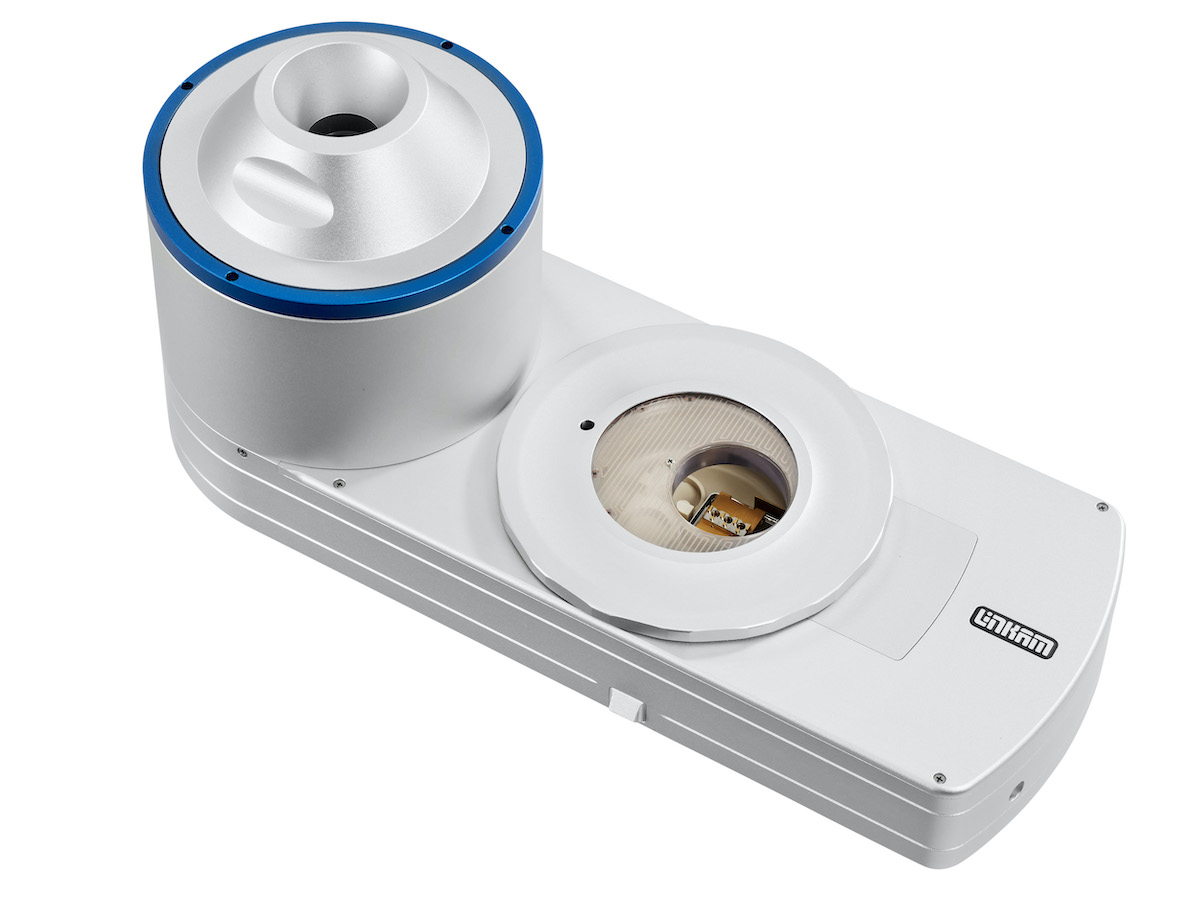 Linkam Scientific Instruments has announced new updates to its specialist CMS196 cryo-stage. The CMS196V4 supports cryo-correlative light and electron microscopy (cryo-CLEM) and allows researchers to investigate samples at cryogenic temperatures down to < -195 °C. The latest updates to the CMS196V4 stage include an improved user interface featuring a touch-panel and joystick, alongside an encoded and motorised XY stage which allows high-precision automated mapping of sample grid...
Linkam Scientific Instruments has announced new updates to its specialist CMS196 cryo-stage. The CMS196V4 supports cryo-correlative light and electron microscopy (cryo-CLEM) and allows researchers to investigate samples at cryogenic temperatures down to < -195 °C. The latest updates to the CMS196V4 stage include an improved user interface featuring a touch-panel and joystick, alongside an encoded and motorised XY stage which allows high-precision automated mapping of sample grid...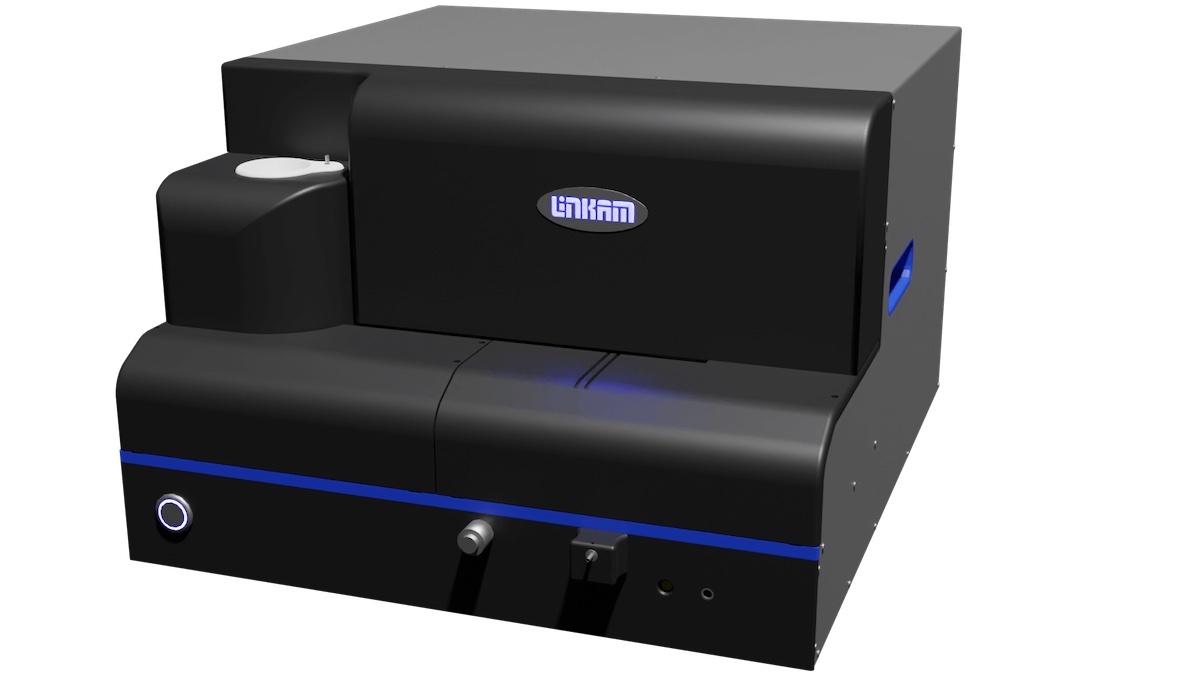 Linkam Scientific Instruments is showcasing its cryo-correlative portfolio at this year’s M&M conference, and will be hosting tutorials and workshops at the event. Linkam will also be presenting two posters during the conference. Linkam’s CryoGenium plunger system, one of the company’s latest developments, will be shown on the booth. The CryoGenium is a fully automated system which offers a range of features for users of cryo-EM, cryo-tomography, single particle tomography (SPT) and cryo-CLEM methods....
Linkam Scientific Instruments is showcasing its cryo-correlative portfolio at this year’s M&M conference, and will be hosting tutorials and workshops at the event. Linkam will also be presenting two posters during the conference. Linkam’s CryoGenium plunger system, one of the company’s latest developments, will be shown on the booth. The CryoGenium is a fully automated system which offers a range of features for users of cryo-EM, cryo-tomography, single particle tomography (SPT) and cryo-CLEM methods....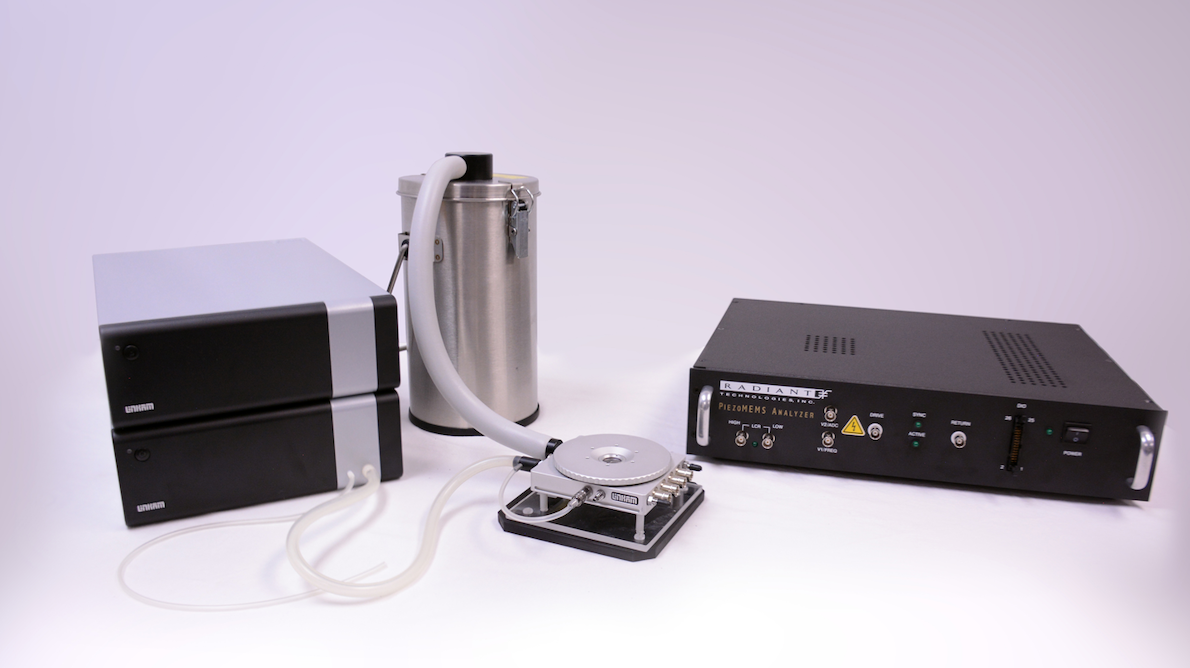 Expert in sample characterisation, Linkam Scientific Instruments, has unveiled its enhanced HFS600E-PB4 probe stage for use in micro-sized electrical component temperature control applications. The new design was implemented in partnership with Linkam’s customer, Radiant Technologies, a major player in the design and manufacture of testing equipment for electrical systems...
Expert in sample characterisation, Linkam Scientific Instruments, has unveiled its enhanced HFS600E-PB4 probe stage for use in micro-sized electrical component temperature control applications. The new design was implemented in partnership with Linkam’s customer, Radiant Technologies, a major player in the design and manufacture of testing equipment for electrical systems...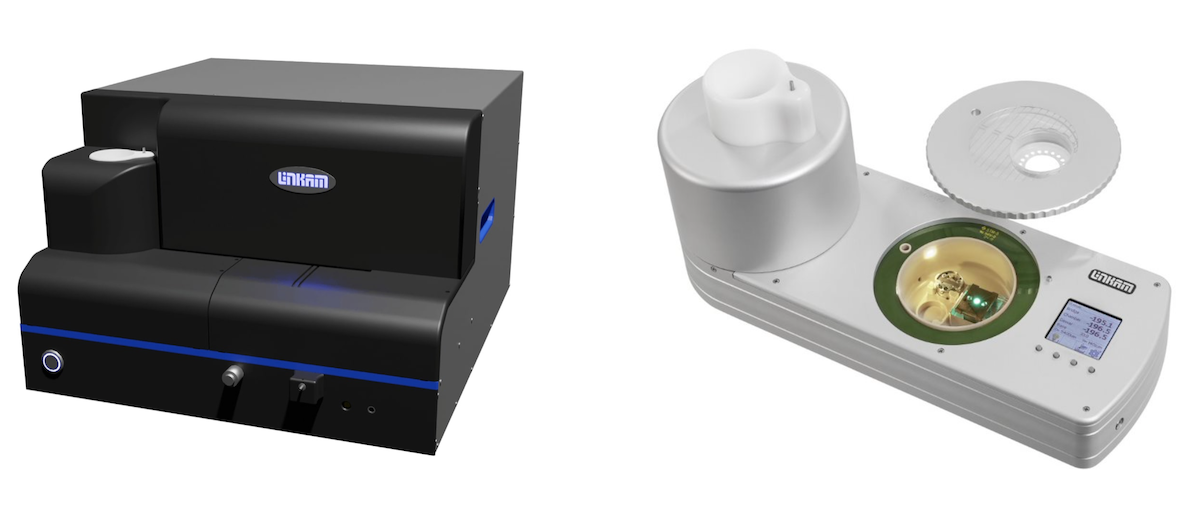 Market leader in temperature and environmental-controlled microscopy, Linkam Scientific Instruments, presented its cryo-correlative systems – the CMS196 and the CryoGenium plunger – at this year’s Microscopy and Microanalysis conference (M&M). Linkam showcased a range of temperature-controlled stages at this year’s M&M, with a focus on its cryo-correlative portfolio, and hosted live tutorials on system operation and performance...
Market leader in temperature and environmental-controlled microscopy, Linkam Scientific Instruments, presented its cryo-correlative systems – the CMS196 and the CryoGenium plunger – at this year’s Microscopy and Microanalysis conference (M&M). Linkam showcased a range of temperature-controlled stages at this year’s M&M, with a focus on its cryo-correlative portfolio, and hosted live tutorials on system operation and performance...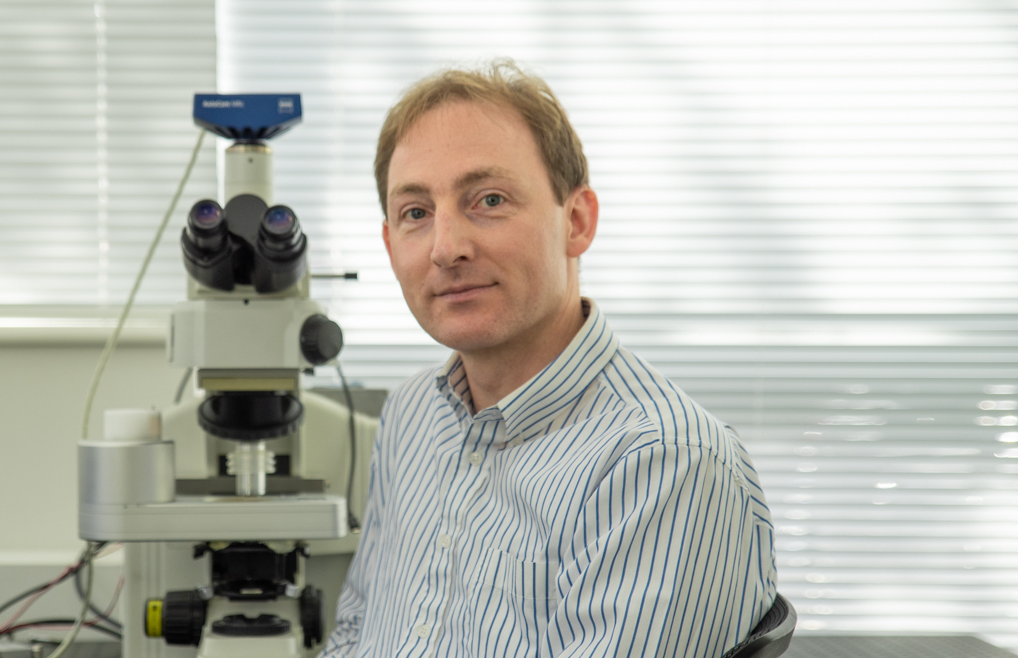 Linkam Scientific presents a new cryo-electron microscopy (cryo-EM) research paper at the Microscopy Conference 2023 (MC2023), Darmstadt, Germany: ‘New principle and robot for vitrification of cryo-EM samples with controllable sample thickness and real-time optical inspection’. Lead author of the paper, Linkam’s senior research scientist Dr. Michael Schwertner, will present new findings in cryo-EM at...
Linkam Scientific presents a new cryo-electron microscopy (cryo-EM) research paper at the Microscopy Conference 2023 (MC2023), Darmstadt, Germany: ‘New principle and robot for vitrification of cryo-EM samples with controllable sample thickness and real-time optical inspection’. Lead author of the paper, Linkam’s senior research scientist Dr. Michael Schwertner, will present new findings in cryo-EM at...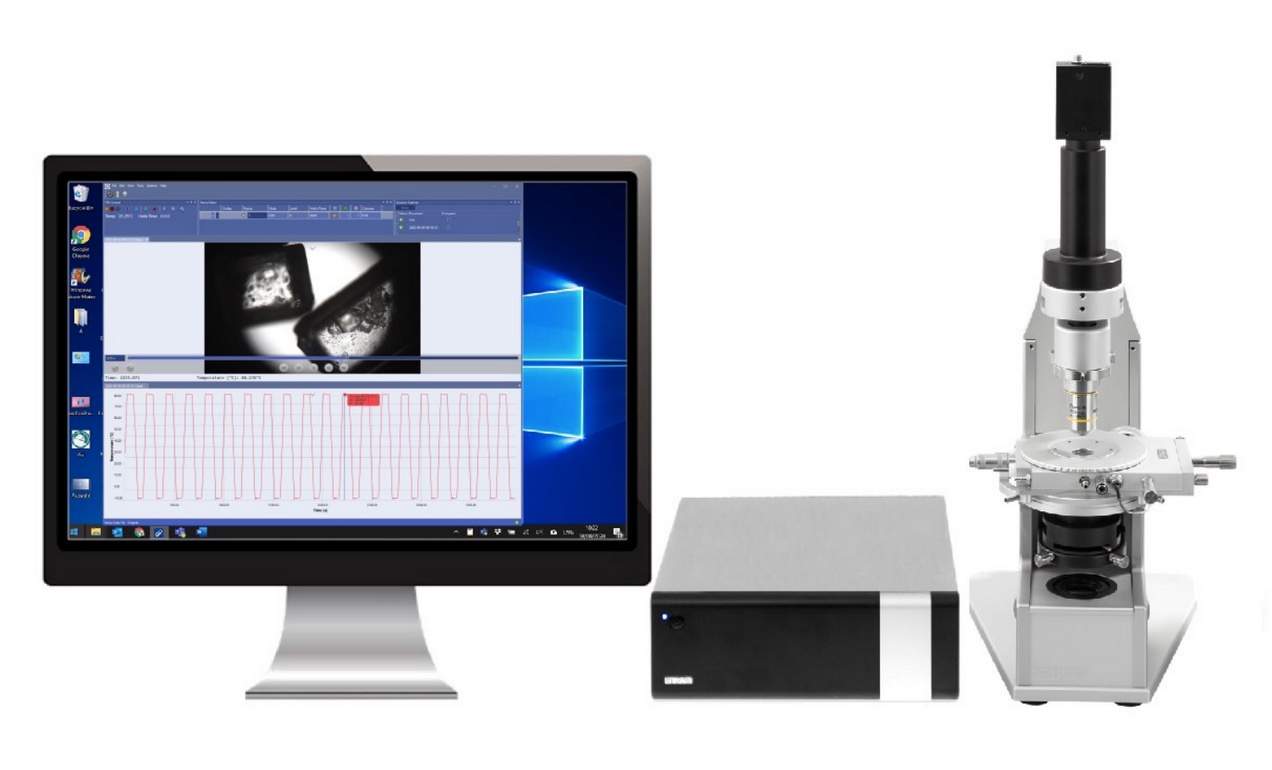 Linkam Scientific Instruments, experts in sample characterisation, has launched a new software, NEXUS, revolutionising the way Linkam stages are used. It is used to precisely control and record all aspects of heating, cooling, vacuum, humidity, and other environmental conditions in a Linkam stage with optional optical measurement capabilities. NEXUS Core is the main NEXUS platform that introduces a range of new specifications to enable a greater degree of experiment control...
Linkam Scientific Instruments, experts in sample characterisation, has launched a new software, NEXUS, revolutionising the way Linkam stages are used. It is used to precisely control and record all aspects of heating, cooling, vacuum, humidity, and other environmental conditions in a Linkam stage with optional optical measurement capabilities. NEXUS Core is the main NEXUS platform that introduces a range of new specifications to enable a greater degree of experiment control...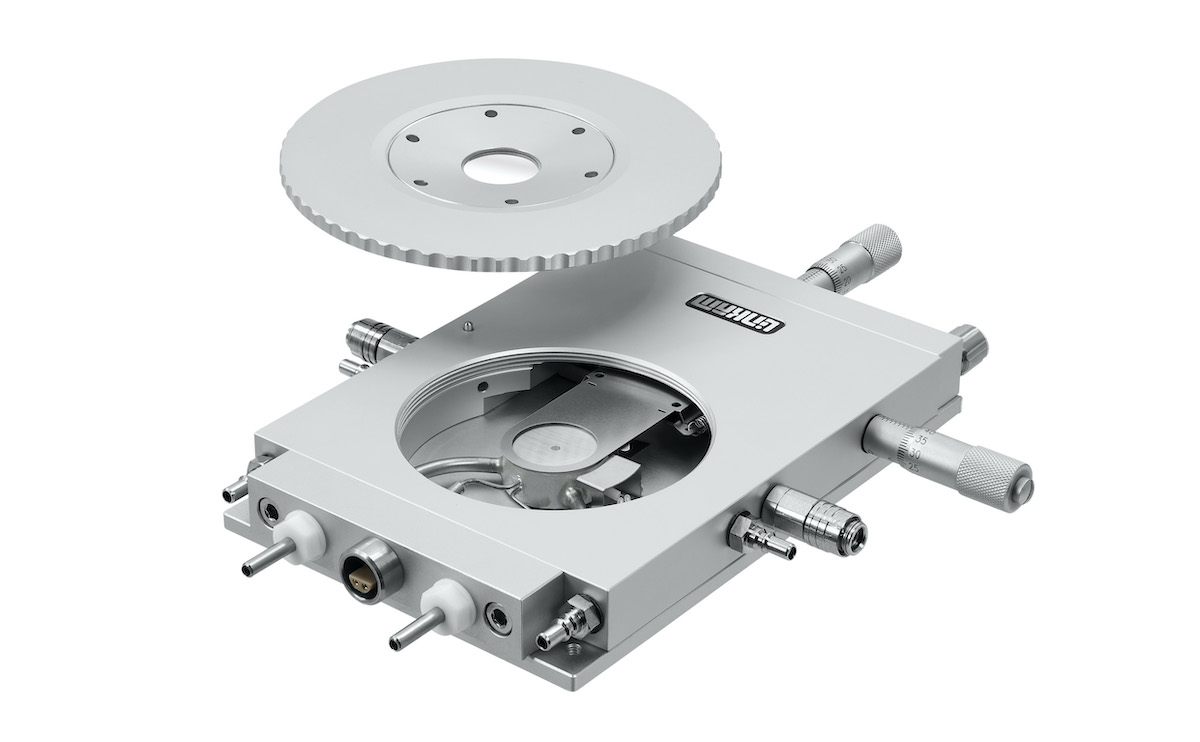 McCrone Microscopes & Accessories will present a range of Linkam’s leading temperature and environment-controlled stages at booth #1134, AMS 2022. The Linkam Modular Force Stage (MFS) is designed to gain a better understanding of a material’s behaviour under different temperature, mechanical stress and environmental conditions. The system offers advanced sensitivity, high resolution and a modular concept for customised experiment design and control...
McCrone Microscopes & Accessories will present a range of Linkam’s leading temperature and environment-controlled stages at booth #1134, AMS 2022. The Linkam Modular Force Stage (MFS) is designed to gain a better understanding of a material’s behaviour under different temperature, mechanical stress and environmental conditions. The system offers advanced sensitivity, high resolution and a modular concept for customised experiment design and control...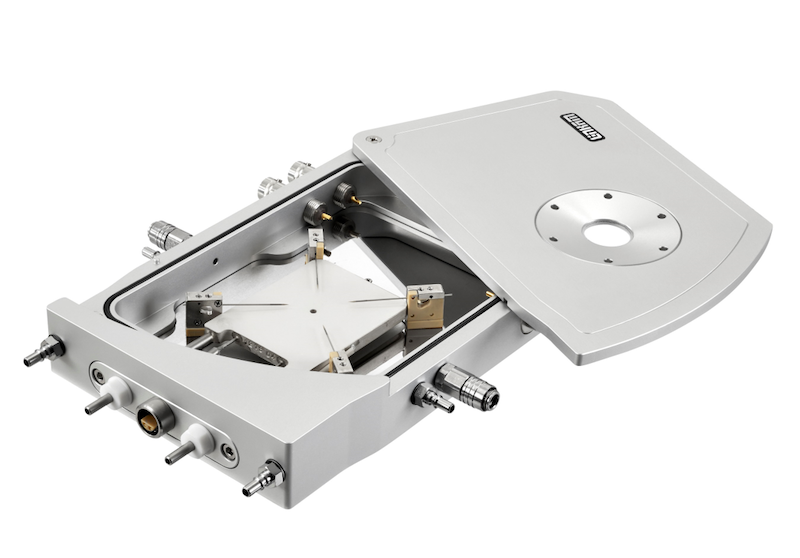 Researchers at Swansea University have used a Linkam LTS420E-P stage to make temperature dependent measurements on organic photovoltaic (PV) cells, advancing our understanding of the PV cells that are the basis of solar power generation. Researchers at Swansea University, UK, have proven that it is possible to achieve near-unity charge generation quantum yields in organic solar cells...
Researchers at Swansea University have used a Linkam LTS420E-P stage to make temperature dependent measurements on organic photovoltaic (PV) cells, advancing our understanding of the PV cells that are the basis of solar power generation. Researchers at Swansea University, UK, have proven that it is possible to achieve near-unity charge generation quantum yields in organic solar cells...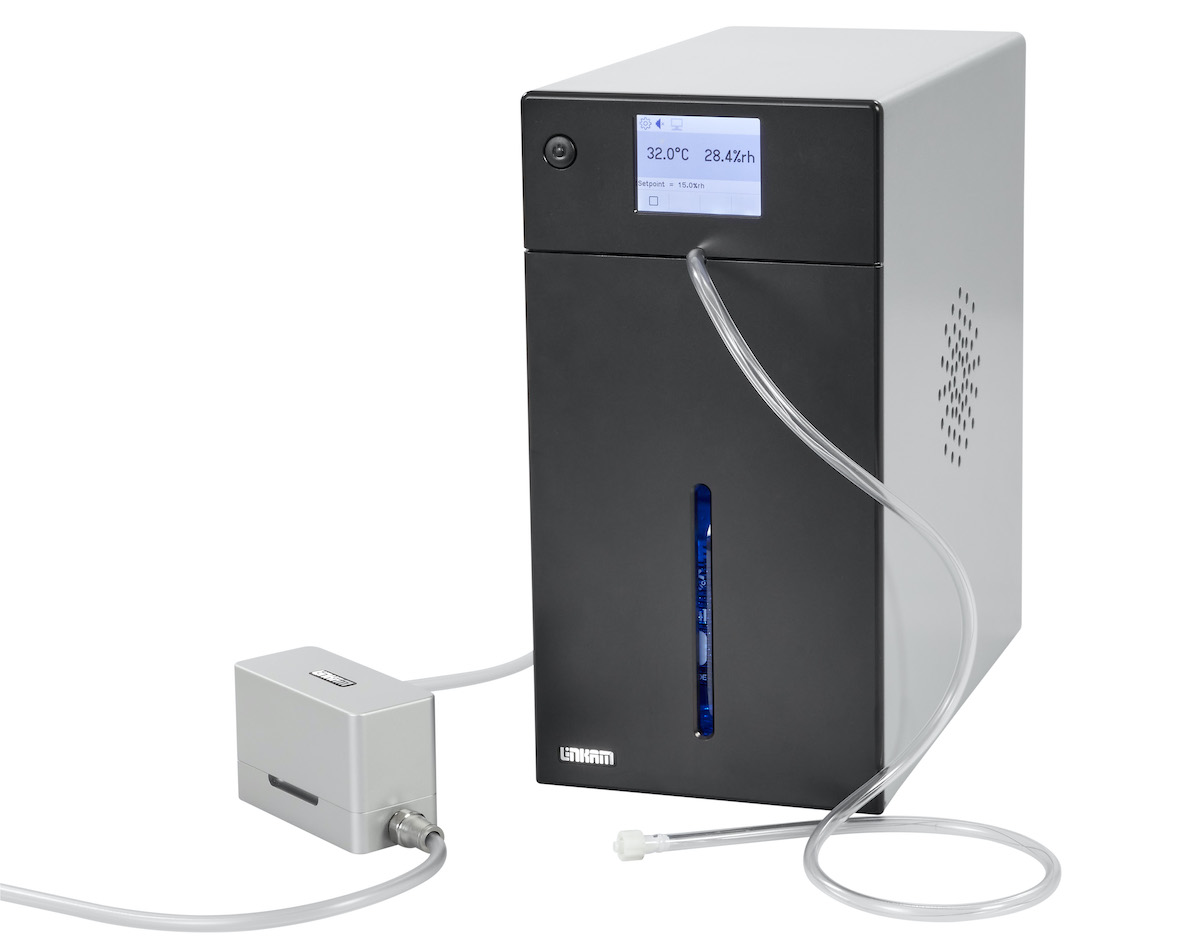 Linkam Scientific Instruments, expert in sample characterisation, has launched the latest update to its range of humidity control systems. The new RHGen Relative Humidity (RH) Controller offers humidity control between 3% and 95% RH, at temperatures from ambient to 85°C, with an upgraded RH sensor and improved connectors, providing environmental control to a variety of Linkam temperature control stages and third-party chambers...
Linkam Scientific Instruments, expert in sample characterisation, has launched the latest update to its range of humidity control systems. The new RHGen Relative Humidity (RH) Controller offers humidity control between 3% and 95% RH, at temperatures from ambient to 85°C, with an upgraded RH sensor and improved connectors, providing environmental control to a variety of Linkam temperature control stages and third-party chambers...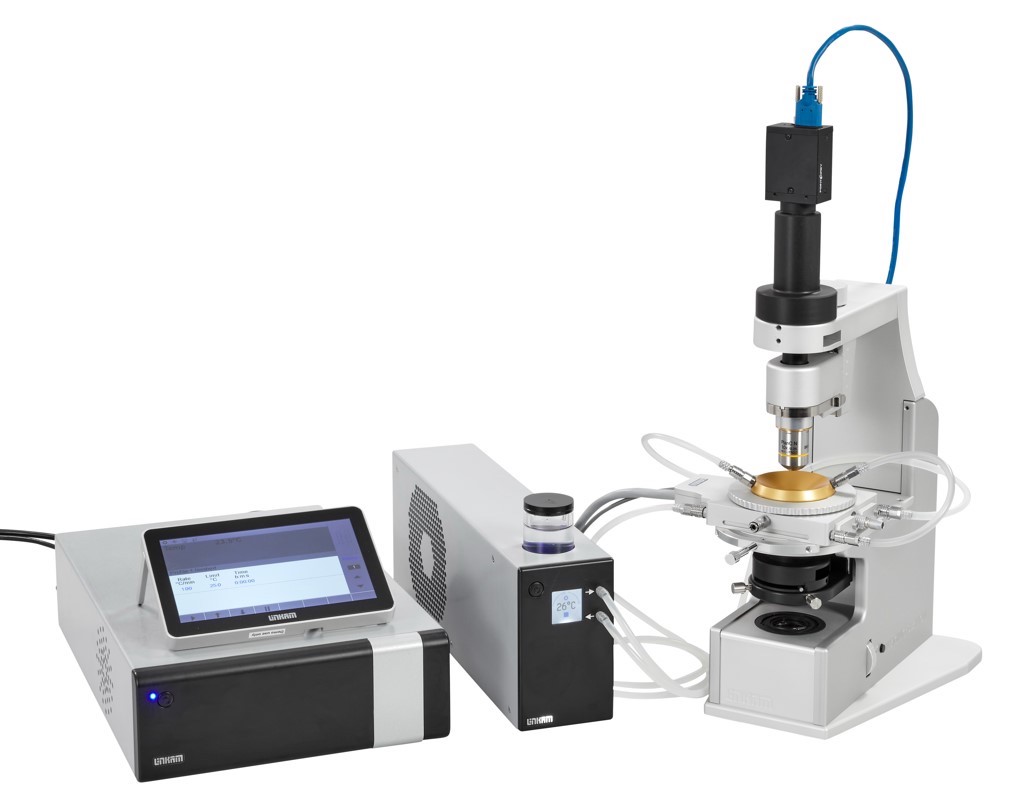 Linkam Scientific Instruments, expert in sample characterisation, has launched a new Water Circulation Pump (WCP), designed specifically to provide optimised water cooling to its range of temperature and environmental control stages. When used with Linkam’s Peltier stages, the WCP is able to hold sample temperatures as low as -30°C (with an ambient temperature of 21°C). The WCP also provides cooling to high temperature stages running up to 1500°C...
Linkam Scientific Instruments, expert in sample characterisation, has launched a new Water Circulation Pump (WCP), designed specifically to provide optimised water cooling to its range of temperature and environmental control stages. When used with Linkam’s Peltier stages, the WCP is able to hold sample temperatures as low as -30°C (with an ambient temperature of 21°C). The WCP also provides cooling to high temperature stages running up to 1500°C...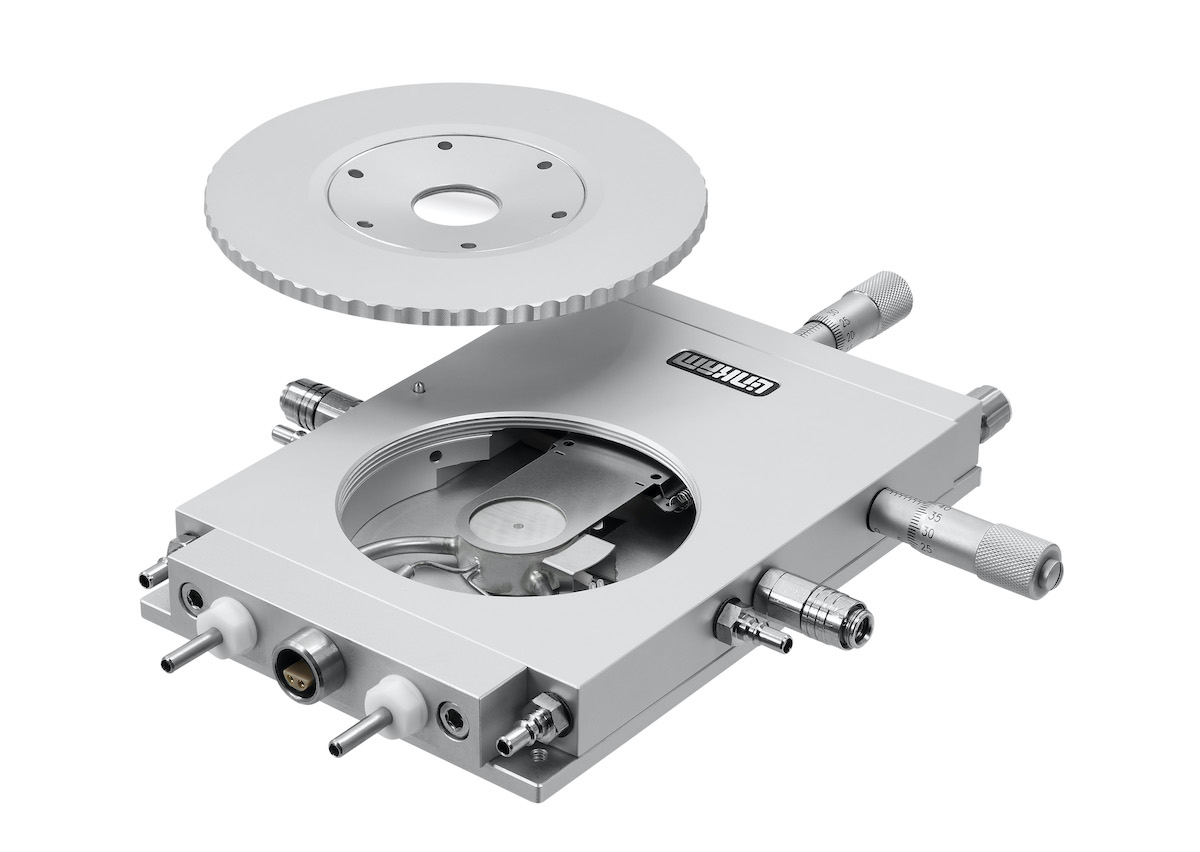 Recent work by a team of researchers at Queen’s University Belfast and University College London has reported on a newly developed strategy for the manufacture of a high drug loaded amorphous solid dispersion (HDASD) using a hot-melt extrusion (HME) based platform. Around 80% of new drug candidates that emerge are classified as poorly soluble...
Recent work by a team of researchers at Queen’s University Belfast and University College London has reported on a newly developed strategy for the manufacture of a high drug loaded amorphous solid dispersion (HDASD) using a hot-melt extrusion (HME) based platform. Around 80% of new drug candidates that emerge are classified as poorly soluble...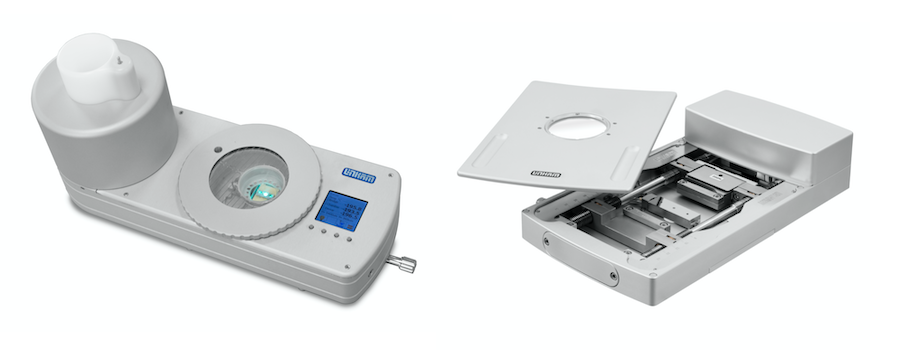 Market leader in temperature-controlled microscopy, Linkam Scientific Instruments, is showcasing its CMS196V3 and Modular Force (MFS) stages at the Microscience Microscopy Conference (MMC) 2021. Linkam is hosting two workshops and a technical showcase at MMC 2021, as well as participating as an exhibitor in the virtual event. The first workshop, taking place on Tuesday 6th July at 10am, will be hosted by Linkam Senior Scientist Dr. Michael Schwertner...
Market leader in temperature-controlled microscopy, Linkam Scientific Instruments, is showcasing its CMS196V3 and Modular Force (MFS) stages at the Microscience Microscopy Conference (MMC) 2021. Linkam is hosting two workshops and a technical showcase at MMC 2021, as well as participating as an exhibitor in the virtual event. The first workshop, taking place on Tuesday 6th July at 10am, will be hosted by Linkam Senior Scientist Dr. Michael Schwertner...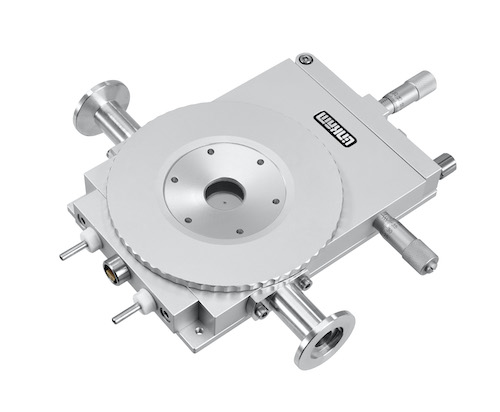 The first study of its kind reports on the enhancement of skin permeability of risperidone (RIS) using eutectic systems. A recent study undertaken at the University of Petra in Jordan describes for the first time the formation of room temperature therapeutic deep eutectic solvent (THEDES) of RIS, an antipsychotic drug that is used in the treatment of schizophrenia, mixed and manic states associated with bipolar disorder and irritability in children and adolescents with autism....
The first study of its kind reports on the enhancement of skin permeability of risperidone (RIS) using eutectic systems. A recent study undertaken at the University of Petra in Jordan describes for the first time the formation of room temperature therapeutic deep eutectic solvent (THEDES) of RIS, an antipsychotic drug that is used in the treatment of schizophrenia, mixed and manic states associated with bipolar disorder and irritability in children and adolescents with autism....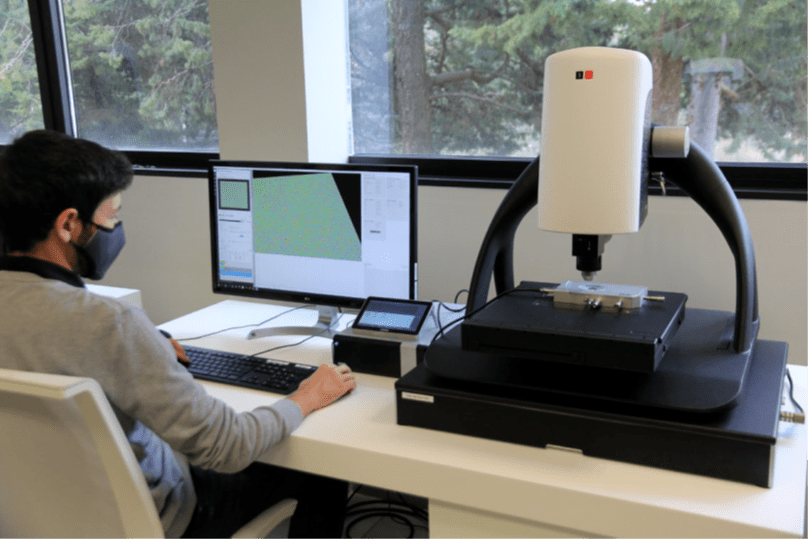 Sensofar, a technology company specialising in the field of non-contact surface metrology, has developed a new technique for characterising the evolution of a sample’s surface topography with temperature using the S neox 3D optical profiler and Linnik interferometer coupled with Linkam’s LTS420 temperature-controlled chamber. The technique has been used to successfully map the changes in roughness and waviness of silicon wafers at temperatures up to 380°C...
Sensofar, a technology company specialising in the field of non-contact surface metrology, has developed a new technique for characterising the evolution of a sample’s surface topography with temperature using the S neox 3D optical profiler and Linnik interferometer coupled with Linkam’s LTS420 temperature-controlled chamber. The technique has been used to successfully map the changes in roughness and waviness of silicon wafers at temperatures up to 380°C...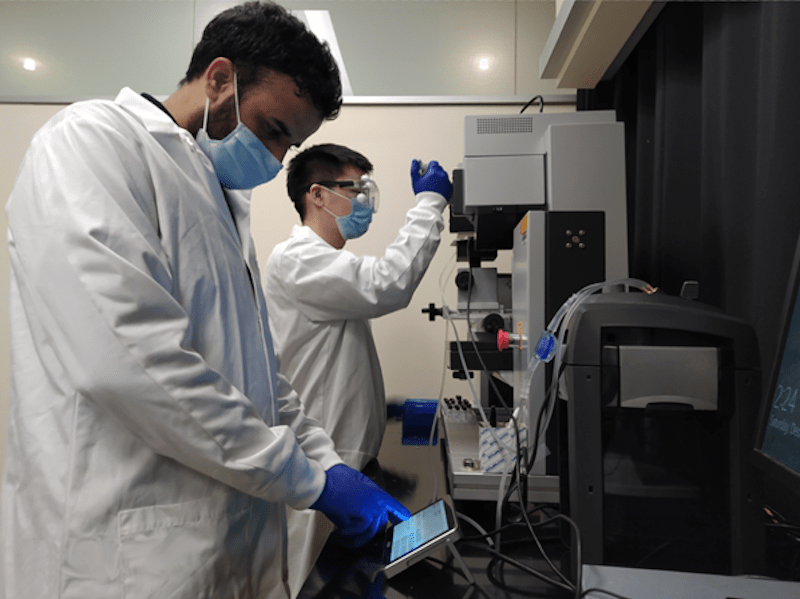 Linkam Scientific’s PE120 Peltier system formed part of the experimental set-up used to develop a radical new diagnostic test for the SARS CoV-2 virus at Ohio State University (OSU), Columbus, Ohio, USA. The global outbreak of COVID-19 has prompted scientists to focus their research on rapid and robust diagnostic tests. Reverse-transcription polymerase chain reaction (RT-PCR) assays – the ‘gold-standard’ for molecular clinical diagnostics – became available quickly, however this provides relatively long characterisation times...
Linkam Scientific’s PE120 Peltier system formed part of the experimental set-up used to develop a radical new diagnostic test for the SARS CoV-2 virus at Ohio State University (OSU), Columbus, Ohio, USA. The global outbreak of COVID-19 has prompted scientists to focus their research on rapid and robust diagnostic tests. Reverse-transcription polymerase chain reaction (RT-PCR) assays – the ‘gold-standard’ for molecular clinical diagnostics – became available quickly, however this provides relatively long characterisation times...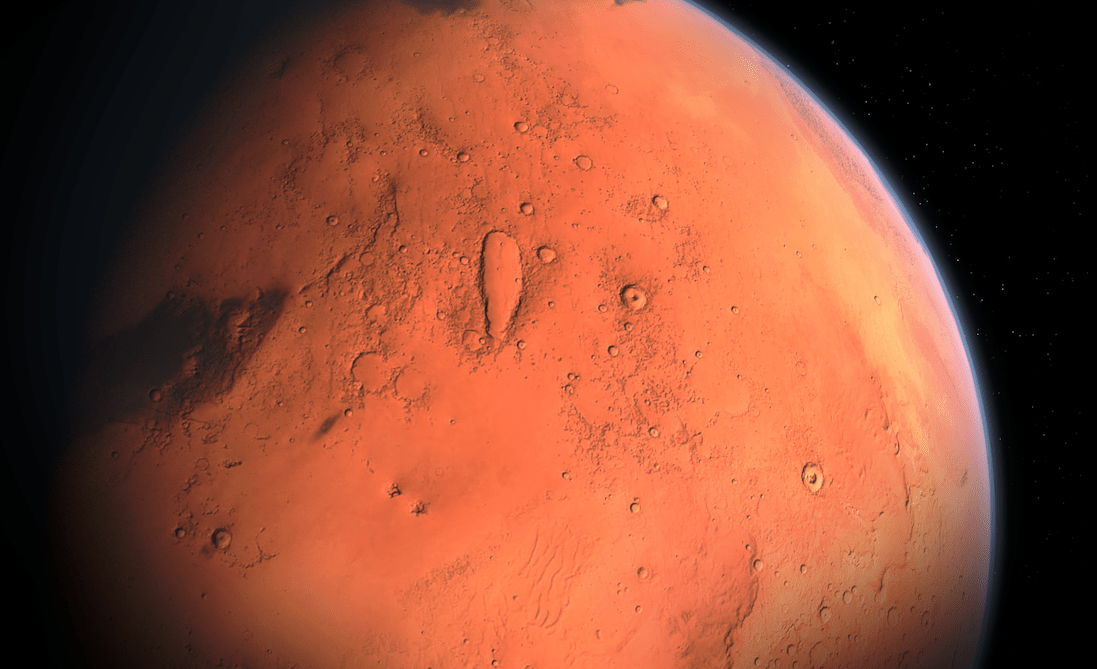 Ahead of the upcoming missions to search for evidence of life on Mars, researchers used Linkam’s HFS600 stage in temperature-controlled experiments to study the formation of mixed sulfates – a key indicator of biological processes on the red planet. NASA’s Mars 2020 Perseverance rover will land on Mars on 18 February 2021, to search for signs of life and explore the planet's geology....
Ahead of the upcoming missions to search for evidence of life on Mars, researchers used Linkam’s HFS600 stage in temperature-controlled experiments to study the formation of mixed sulfates – a key indicator of biological processes on the red planet. NASA’s Mars 2020 Perseverance rover will land on Mars on 18 February 2021, to search for signs of life and explore the planet's geology....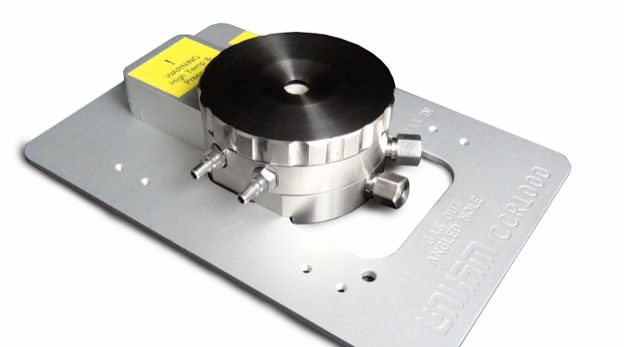 Linkam has recently seen an increased interest in its stage that was specifically designed for the analysis of catalytic reactions: the CCR1000. Catalysis is a technique for improving the yield or rate of a chemical reaction using a catalyst material. A wide range of catalytic materials are available; including aluminosilicates, which are used in the petrochemical industry to reduce natural materials to smaller hydrocarbons...
Linkam has recently seen an increased interest in its stage that was specifically designed for the analysis of catalytic reactions: the CCR1000. Catalysis is a technique for improving the yield or rate of a chemical reaction using a catalyst material. A wide range of catalytic materials are available; including aluminosilicates, which are used in the petrochemical industry to reduce natural materials to smaller hydrocarbons...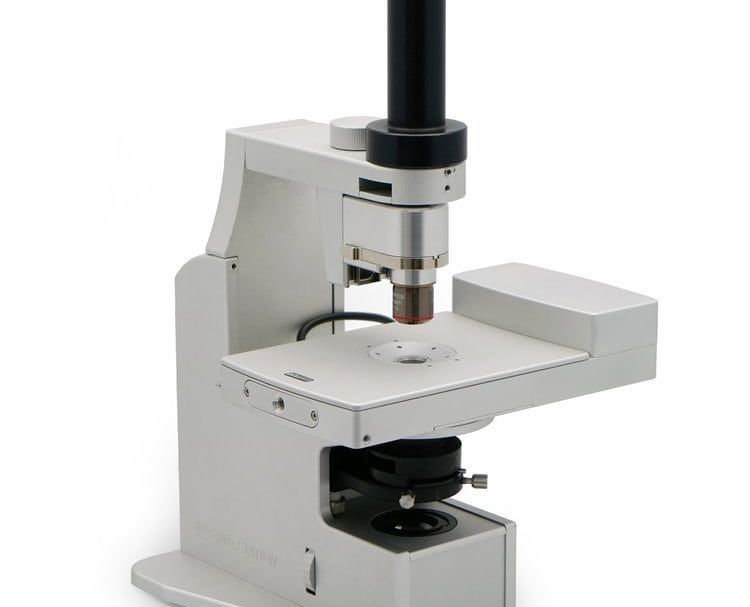 Linkam Scientific is excited to be exhibiting at ArabLab for the first time in 2020, amid a period of global expansion. The company designs and manufactures scientific instruments, electronics and software that can be used in conjunction with optical microscopes and a wide range of analytical techniques including Raman, FTIR, WAX/SAX and other X-ray techniques to enable scientists to analyse and characterise samples.....
Linkam Scientific is excited to be exhibiting at ArabLab for the first time in 2020, amid a period of global expansion. The company designs and manufactures scientific instruments, electronics and software that can be used in conjunction with optical microscopes and a wide range of analytical techniques including Raman, FTIR, WAX/SAX and other X-ray techniques to enable scientists to analyse and characterise samples.....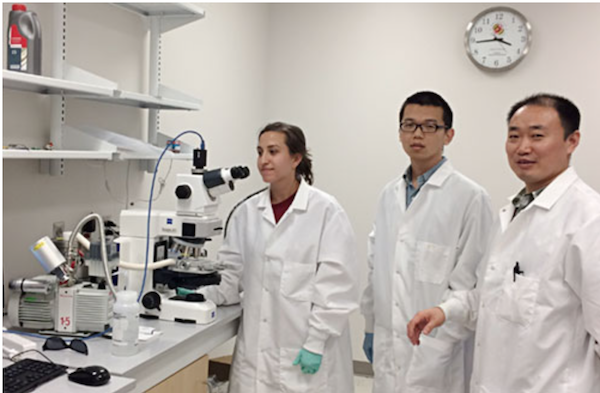 Market leaders in temperature-controlled microscopy and leaders in sample characterization solutions, Linkam Scientific Instruments, reports on the research of Professor Xiaoming “Shawn” He of the Fischell Department of Bioengineering at the University of Maryland. Professor He's research is focused on developing multiscale biomaterials to engineer living cells and tissues for two applications: Cancer treatment and cell-based medicine...
Market leaders in temperature-controlled microscopy and leaders in sample characterization solutions, Linkam Scientific Instruments, reports on the research of Professor Xiaoming “Shawn” He of the Fischell Department of Bioengineering at the University of Maryland. Professor He's research is focused on developing multiscale biomaterials to engineer living cells and tissues for two applications: Cancer treatment and cell-based medicine...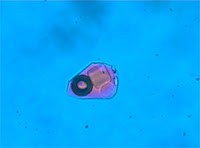 Linkam Scientific Instruments, reports on the research of Dr Jamie Wilkinson of the Natural History Museum in London where he uses temperature-controlled microscopy to characterize mineral deposits. Dr Jamie Wilkinson is a Research Leader in Mineral Deposits in the Department of Earth Sciences at the Natural History Museum, London. He is a member of the London Centre for Ore Deposits and Exploration (LODE) Research Group...
Linkam Scientific Instruments, reports on the research of Dr Jamie Wilkinson of the Natural History Museum in London where he uses temperature-controlled microscopy to characterize mineral deposits. Dr Jamie Wilkinson is a Research Leader in Mineral Deposits in the Department of Earth Sciences at the Natural History Museum, London. He is a member of the London Centre for Ore Deposits and Exploration (LODE) Research Group...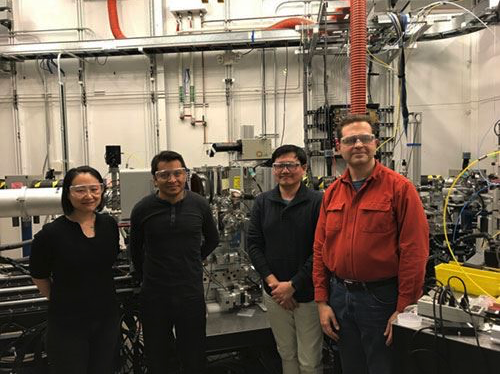 Market leaders in temperature-controlled microscopy, Linkam Scientific Instruments, report on how groups of scientists at Argonne National Laboratory are making grazing-incidence x-ray scattering measurements using a Linkam HFSX350 thermal stage on Beamline 8-ID-E under the guidance of the Time-Resolved Research group. Dr Joseph Strzalka is a physicist...
Market leaders in temperature-controlled microscopy, Linkam Scientific Instruments, report on how groups of scientists at Argonne National Laboratory are making grazing-incidence x-ray scattering measurements using a Linkam HFSX350 thermal stage on Beamline 8-ID-E under the guidance of the Time-Resolved Research group. Dr Joseph Strzalka is a physicist...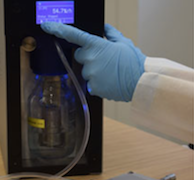 Market leaders in temperature-controlled microscopy, Linkam Scientific Instruments, report on how Astra Zeneca monitor changes in humidity and their effects on the development of new APIs. The work is being led by Dr James McCabe, Associate Principal Scientist based at the Macclesfield laboratories of Astra Zeneca....
Market leaders in temperature-controlled microscopy, Linkam Scientific Instruments, report on how Astra Zeneca monitor changes in humidity and their effects on the development of new APIs. The work is being led by Dr James McCabe, Associate Principal Scientist based at the Macclesfield laboratories of Astra Zeneca....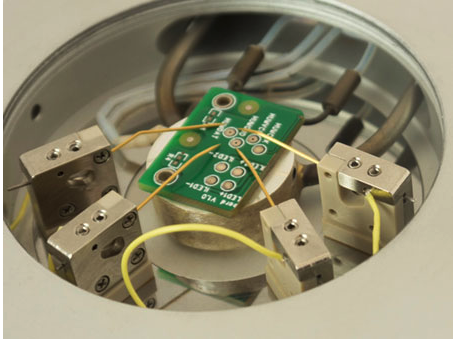 Market leaders in temperature-controlled microscopy and leaders in sample characterization solutions, Linkam Scientific Instruments, reports on work from users in Singapore and Swansea to characterize perovskites, an exciting material with increasing numbers of applications in photovoltaics. Linkam is a sponsor of the 2018 International Conference on Perovskite Thin Film Photovoltaics in Rennes, France
Market leaders in temperature-controlled microscopy and leaders in sample characterization solutions, Linkam Scientific Instruments, reports on work from users in Singapore and Swansea to characterize perovskites, an exciting material with increasing numbers of applications in photovoltaics. Linkam is a sponsor of the 2018 International Conference on Perovskite Thin Film Photovoltaics in Rennes, France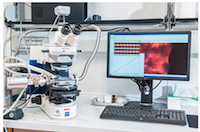
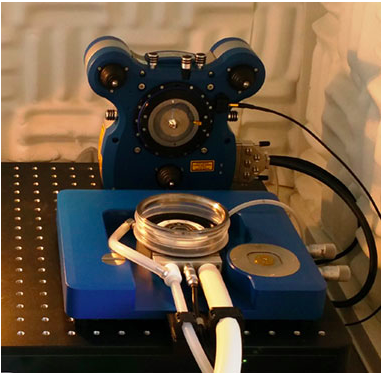 Linkam has been developing cryo stages for correlative microscopies for many years while JPK Instruments is regarded as a leading supplier of nanoscale resolution SPM & Optical Tweezer systems. Bringing their technologies together has enabled JPK to offer cryo-stage capability for their NanoWizard® AFM systems. This means AFM users may now study surface property changes as a function of temperature over the range of -120 °C to +220 °C. Head of Applications at JPK...
Linkam has been developing cryo stages for correlative microscopies for many years while JPK Instruments is regarded as a leading supplier of nanoscale resolution SPM & Optical Tweezer systems. Bringing their technologies together has enabled JPK to offer cryo-stage capability for their NanoWizard® AFM systems. This means AFM users may now study surface property changes as a function of temperature over the range of -120 °C to +220 °C. Head of Applications at JPK...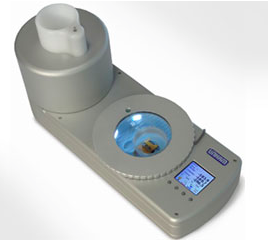 Linkam has been developing cryo stages for correlative microscopy for many years and continues to be at the forefront of cryo-correlative microscopy with the latest update of their LINK software for the CMS196M, providing improved imaging capabilities and the new liquid nitrogen autofill system providing longer run times. Cryo-correlative microscopy has become an established technique in recent years....
Linkam has been developing cryo stages for correlative microscopy for many years and continues to be at the forefront of cryo-correlative microscopy with the latest update of their LINK software for the CMS196M, providing improved imaging capabilities and the new liquid nitrogen autofill system providing longer run times. Cryo-correlative microscopy has become an established technique in recent years....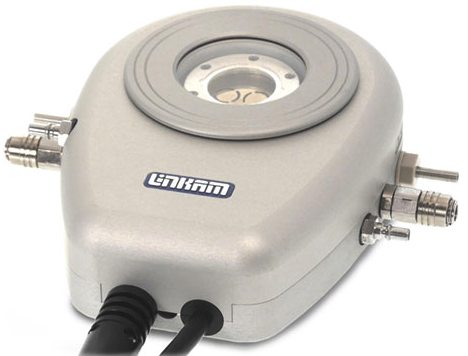 Linkam's engineers are continually working to develop constructive solutions to practical problems. One of the latest developments is the Optical DSC450, a Differential Scanning Calorimeter for measurements up to 450 °C. Differential scanning calorimetry, DSC, is a technique used to measure temperatures and heat flow associated with thermal transitions in a material....
Linkam's engineers are continually working to develop constructive solutions to practical problems. One of the latest developments is the Optical DSC450, a Differential Scanning Calorimeter for measurements up to 450 °C. Differential scanning calorimetry, DSC, is a technique used to measure temperatures and heat flow associated with thermal transitions in a material....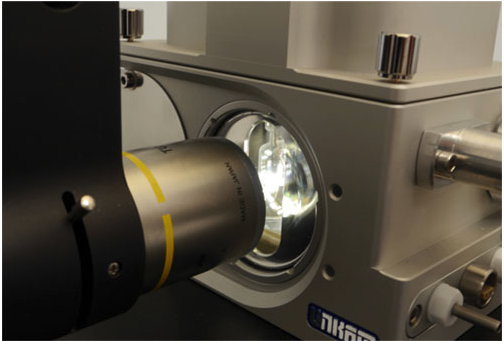 Replicating large scale industrial freeze drying processes as smaller test runs is an effective way to save time, cut costs and perfect the technicalities of an operation run. With this in mind, Linkam engineers have created the new Freeze Drying Vial System - FDVS. Building on the experience gained from the FDCS Freeze Drying stage....
Replicating large scale industrial freeze drying processes as smaller test runs is an effective way to save time, cut costs and perfect the technicalities of an operation run. With this in mind, Linkam engineers have created the new Freeze Drying Vial System - FDVS. Building on the experience gained from the FDCS Freeze Drying stage....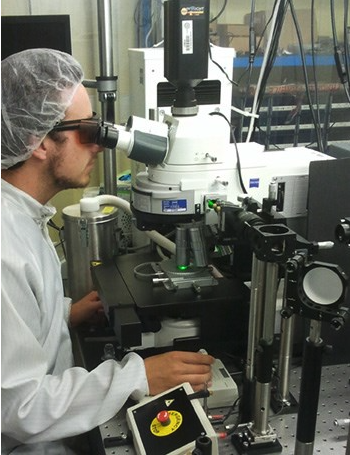 Frédéric Caupin is a Professor in the Liquids and Interfaces Group at the Institute of Light and Matter CNRS at Université Claude Bernard Lyon 1. The main motivation of his research is the study of water anomalies. Indeed, water is the most common liquid, but also the most anomalous. For instance, it expands upon cooling below 4 °C. Water anomalies are due to the complex hydrogen bonded network present. These anomalies get even more pronounced in the...
Frédéric Caupin is a Professor in the Liquids and Interfaces Group at the Institute of Light and Matter CNRS at Université Claude Bernard Lyon 1. The main motivation of his research is the study of water anomalies. Indeed, water is the most common liquid, but also the most anomalous. For instance, it expands upon cooling below 4 °C. Water anomalies are due to the complex hydrogen bonded network present. These anomalies get even more pronounced in the...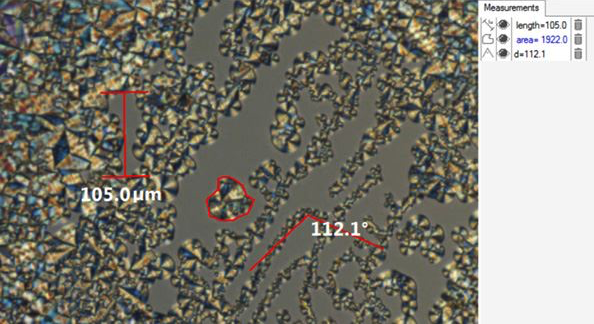 After listening to user feedback, Linkam has created new LINK software with an intelligent user interface that delivers a practical and intuitive system experience to users of their temperature controlled microscopy stages. Convenient and reliable software is of paramount importance to the scientific community and LINK now provides this....
After listening to user feedback, Linkam has created new LINK software with an intelligent user interface that delivers a practical and intuitive system experience to users of their temperature controlled microscopy stages. Convenient and reliable software is of paramount importance to the scientific community and LINK now provides this....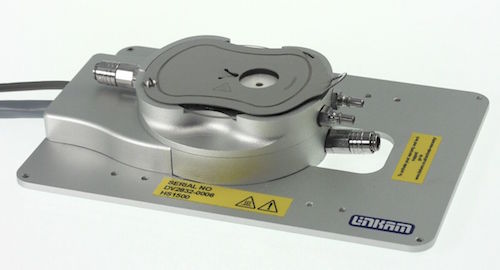 Linkam high temperature stages are used in a wide variety of applications including geology, metallurgy, ceramics and high temperature polymers. When some samples are heated to high temperatures, they can release volatile components which condense on the window, obscuring the optical path. To overcome this, Linkam engineers have developed a simple but extremely effective solution. The new HS1500...
Linkam high temperature stages are used in a wide variety of applications including geology, metallurgy, ceramics and high temperature polymers. When some samples are heated to high temperatures, they can release volatile components which condense on the window, obscuring the optical path. To overcome this, Linkam engineers have developed a simple but extremely effective solution. The new HS1500...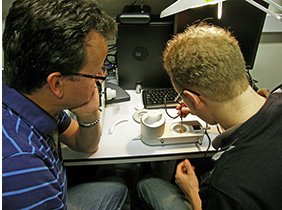 Dr Paul Verkade is a Reader in Cell Imaging in the School of Biochemistry at the University of Bristol where he also heads the Electron Microscopy unit of the Wolfson Bioimaging Facility. His current research focus is to develop techniques and tools for the use of Correlative Light Electron Microscopy (CLEM) studying endocytic sorting. Dr. Verkade is currently chair of the Electron Microscopy section of the Royal Microscopy Society and chair of...
Dr Paul Verkade is a Reader in Cell Imaging in the School of Biochemistry at the University of Bristol where he also heads the Electron Microscopy unit of the Wolfson Bioimaging Facility. His current research focus is to develop techniques and tools for the use of Correlative Light Electron Microscopy (CLEM) studying endocytic sorting. Dr. Verkade is currently chair of the Electron Microscopy section of the Royal Microscopy Society and chair of...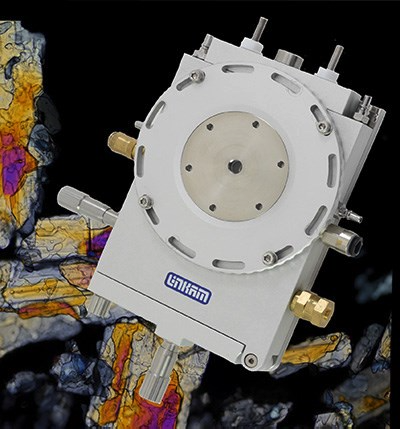 This work was carried out at the Katholic University of Leuven in Belgium. The Katholic University of Leuven in central Belgium provides nine clusters, or Key Areas, of scientific research. The Centre for Surface Chemistry and Catalysis is a group within the Department of Microbial and Molecular Systems, M2S. Fuel cells are one of the key areas of research. Fuel cells, and in particular polymer electrolyte membrane fuel cells (PEMFCs) have been earmarked as highly...
This work was carried out at the Katholic University of Leuven in Belgium. The Katholic University of Leuven in central Belgium provides nine clusters, or Key Areas, of scientific research. The Centre for Surface Chemistry and Catalysis is a group within the Department of Microbial and Molecular Systems, M2S. Fuel cells are one of the key areas of research. Fuel cells, and in particular polymer electrolyte membrane fuel cells (PEMFCs) have been earmarked as highly...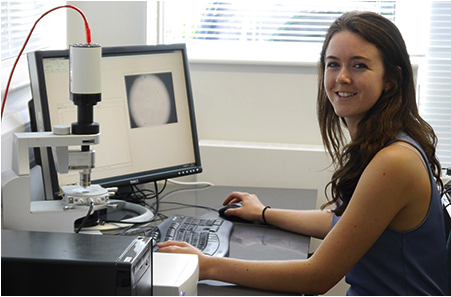 Linkam's continued growth in sales worldwide has led to a further hire in the support team under sales and marketing manager, Duncan Stacey. He outlines the position: “With our sales and product development being driven by feedback from our users a Market leaders in temperature controlled microscopy, Linkam Scientific Instruments, are pleased to announce a new member of staff to join their growing sales and marketing support team. Linkam's continued...
Linkam's continued growth in sales worldwide has led to a further hire in the support team under sales and marketing manager, Duncan Stacey. He outlines the position: “With our sales and product development being driven by feedback from our users a Market leaders in temperature controlled microscopy, Linkam Scientific Instruments, are pleased to announce a new member of staff to join their growing sales and marketing support team. Linkam's continued...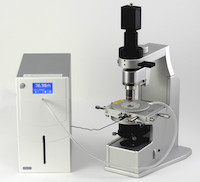 The new RH95 Relative Humidity Controller is the latest addition to provide precise environmental sample control to Linkam’s range of temperature stages. It has been developed based on the feedback of many Linkam users in the materials, foods and pharmaceutical industries where humidity plays an important role in product development, manufacture and even storage. It will be shown on stand number 411 at mmc2015, the biennial conference and exhibition organised by the Royal Microscopical Society.
The new RH95 Relative Humidity Controller is the latest addition to provide precise environmental sample control to Linkam’s range of temperature stages. It has been developed based on the feedback of many Linkam users in the materials, foods and pharmaceutical industries where humidity plays an important role in product development, manufacture and even storage. It will be shown on stand number 411 at mmc2015, the biennial conference and exhibition organised by the Royal Microscopical Society.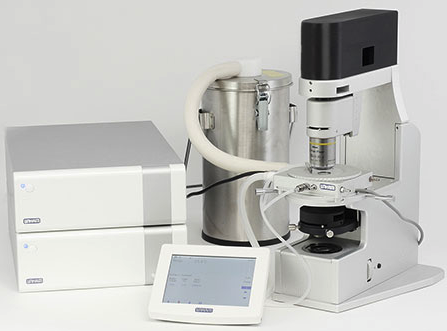 Dr Sheng Qi is a senior lecturer in pharmaceutics in the School of Pharmacy at the University of East Anglia. Sheng's current research interests focus on gaining a fundamental understanding of the behaviour of drug-polymer/lipid dispersions in solid (phase behaviour) and liquid (in biological fluids) states. She is also developing new approaches for stabilising supersaturated drug dispersions. By working with industrial partners as well as...
Dr Sheng Qi is a senior lecturer in pharmaceutics in the School of Pharmacy at the University of East Anglia. Sheng's current research interests focus on gaining a fundamental understanding of the behaviour of drug-polymer/lipid dispersions in solid (phase behaviour) and liquid (in biological fluids) states. She is also developing new approaches for stabilising supersaturated drug dispersions. By working with industrial partners as well as...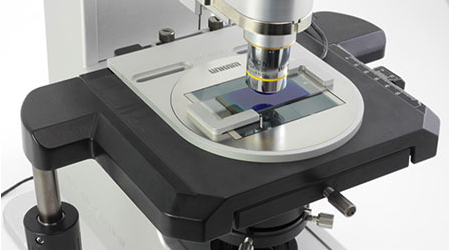 At the 2015 and 10th anniversary annual meeting of the Association of Biomedical Andrologists, Linkam have introduced a new solution for embryologists seeking a better solution for the evaluation and quantification of sperm. Live cell research and, specifically, the testing of sperm in clinics and hospitals, has not been well served in terms of reliable instrumentation and testing protocols. Mr Stephen Harbottle is Chairman of the Association...
At the 2015 and 10th anniversary annual meeting of the Association of Biomedical Andrologists, Linkam have introduced a new solution for embryologists seeking a better solution for the evaluation and quantification of sperm. Live cell research and, specifically, the testing of sperm in clinics and hospitals, has not been well served in terms of reliable instrumentation and testing protocols. Mr Stephen Harbottle is Chairman of the Association...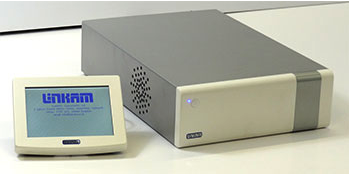 The LinkPad 2 has been developed from Linkam's successful stand-alone series of controllers. The key motivation behind its release is to provide users with the ability to control complete experiments from an intuitive touch screen without the need for a PC. LinkPad 2 is now the flagship controller for the complete range of Linkam's temperature stages. These stages have been individually designed to meet specific applications needs, each calling...
The LinkPad 2 has been developed from Linkam's successful stand-alone series of controllers. The key motivation behind its release is to provide users with the ability to control complete experiments from an intuitive touch screen without the need for a PC. LinkPad 2 is now the flagship controller for the complete range of Linkam's temperature stages. These stages have been individually designed to meet specific applications needs, each calling...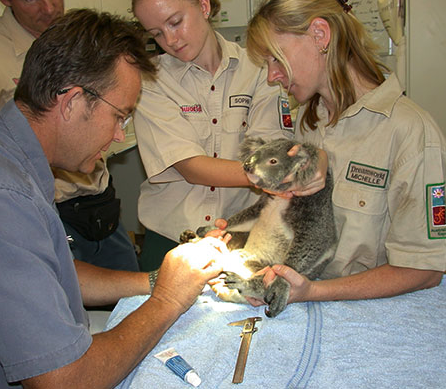 Since its inception, the technique of Artificial Insemination (AI) has been a controversial yet vital in vivo fertilization method which is regularly used as a fertility treatment for humans, as well as for animal breeding and conservation. The technique, which has been around since the early part of the twentieth century, really became mainstream after the birth of the first ‘test tube baby’ in 1978. Since the 1980s, AI has become a multi-billion pound...
Since its inception, the technique of Artificial Insemination (AI) has been a controversial yet vital in vivo fertilization method which is regularly used as a fertility treatment for humans, as well as for animal breeding and conservation. The technique, which has been around since the early part of the twentieth century, really became mainstream after the birth of the first ‘test tube baby’ in 1978. Since the 1980s, AI has become a multi-billion pound...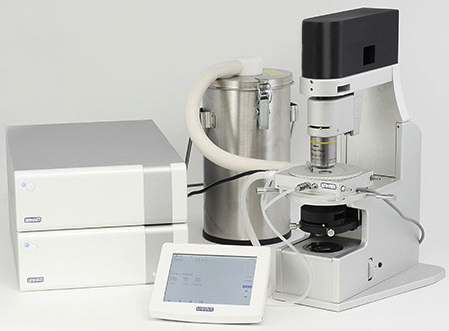 The product made its debut at TAC 2015, Churchill College, Cambridge, March 30th – April 1st. Linkam Scientific Instruments have collaborated with renowned UK inventor and innovating researcher, Professor Mike Reading of the University of Huddersfield. They have developed a product line of instrumentation based on new technologies that are announced at the 50th Anniversary meeting of the UK's Thermal Methods Group at...
The product made its debut at TAC 2015, Churchill College, Cambridge, March 30th – April 1st. Linkam Scientific Instruments have collaborated with renowned UK inventor and innovating researcher, Professor Mike Reading of the University of Huddersfield. They have developed a product line of instrumentation based on new technologies that are announced at the 50th Anniversary meeting of the UK's Thermal Methods Group at...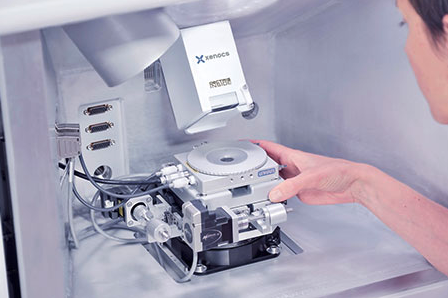 Linkam is pleased to announce that their temperature stages have been chosen by Xenocs to incorporate in their recently launched Nano-inXider X-ray characterisation system opening new perspectives in many research fields. Xenocs is a French instrument company formed as a spinout from the Laue Langevin Institute. The company provides solutions for nanomaterial characterisation using Small and Wide Angle X-ray Scattering technique...
Linkam is pleased to announce that their temperature stages have been chosen by Xenocs to incorporate in their recently launched Nano-inXider X-ray characterisation system opening new perspectives in many research fields. Xenocs is a French instrument company formed as a spinout from the Laue Langevin Institute. The company provides solutions for nanomaterial characterisation using Small and Wide Angle X-ray Scattering technique...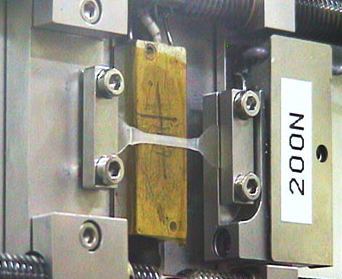 Global demand for environmentally friendly materials has increased drastically over the last few years making it a multi-billion pound industry. This in turn has driven the demand for the production and research into biodegradable plastics such as poly(butylene succinate), PBS. Teams from Beijing National Laboratory, Beijing Key Laboratory of Clothing Materials and Tianjin University in China have been looking into the structural characteristics of these plastics to see how they are affected by tensile forces...
Global demand for environmentally friendly materials has increased drastically over the last few years making it a multi-billion pound industry. This in turn has driven the demand for the production and research into biodegradable plastics such as poly(butylene succinate), PBS. Teams from Beijing National Laboratory, Beijing Key Laboratory of Clothing Materials and Tianjin University in China have been looking into the structural characteristics of these plastics to see how they are affected by tensile forces...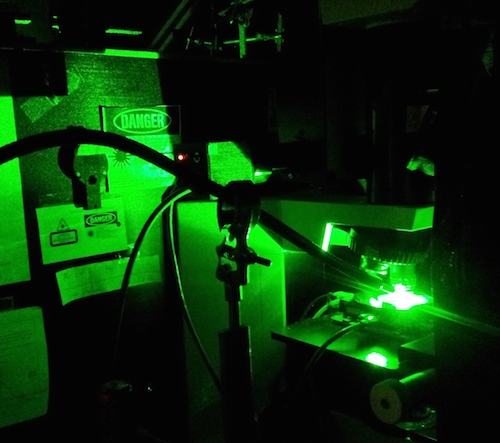 With the best part of half a million visitors every year, The Ny Carlsberg Glyptotek is the showcase for some of the most important cultural heritage artwork in the whole of Denmark. Established in 1882, it is an internationally renowned museum situated in the heart of the capital city of Copenhagen. The museum is built around the personal collection of art that belonged to Carl Jacobsen, the son of the founder of the Carlsberg Breweries....
With the best part of half a million visitors every year, The Ny Carlsberg Glyptotek is the showcase for some of the most important cultural heritage artwork in the whole of Denmark. Established in 1882, it is an internationally renowned museum situated in the heart of the capital city of Copenhagen. The museum is built around the personal collection of art that belonged to Carl Jacobsen, the son of the founder of the Carlsberg Breweries....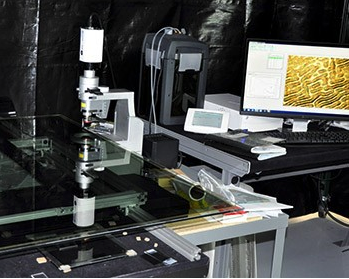
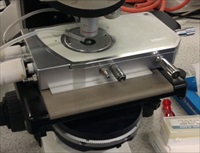
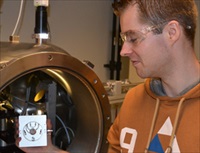
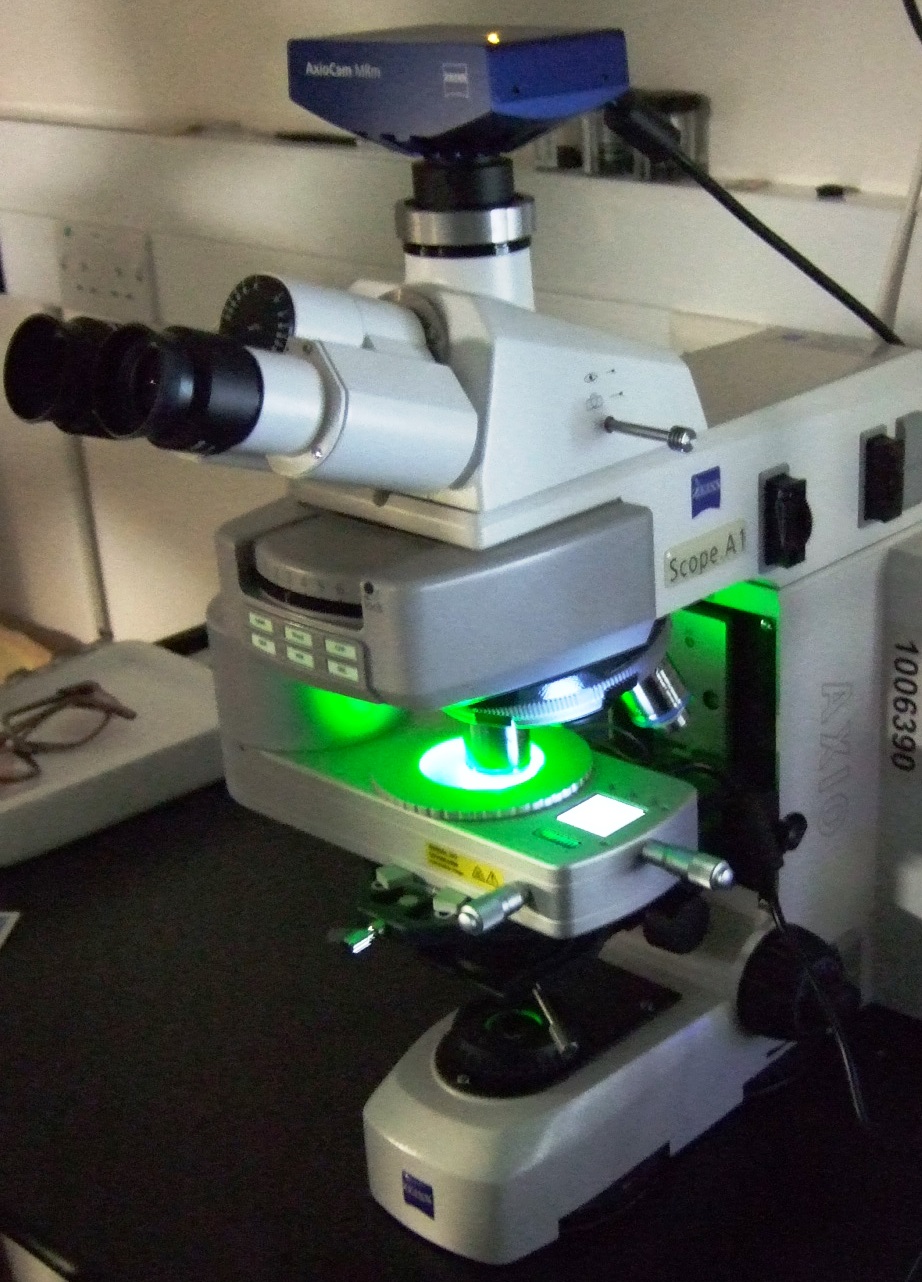
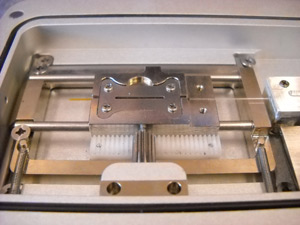
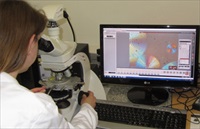
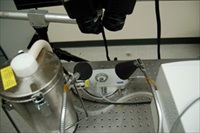 The Opto-Mechanics and Physical Reliability Laboratory at SUNY Binghamton is seeking to understand the electronic packaging and reliability using numerical and experimental methods. They use Digital Image Correlation (DIC), a non-contact optical deformation measurement technique which provides full field in plane and out of plane deformation with subpixel accuracy. This enables recognition of distinct features on the test surface based on the gray scale variation in an image and assigns coordinates to these features...
The Opto-Mechanics and Physical Reliability Laboratory at SUNY Binghamton is seeking to understand the electronic packaging and reliability using numerical and experimental methods. They use Digital Image Correlation (DIC), a non-contact optical deformation measurement technique which provides full field in plane and out of plane deformation with subpixel accuracy. This enables recognition of distinct features on the test surface based on the gray scale variation in an image and assigns coordinates to these features...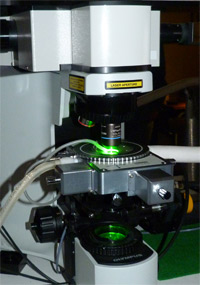
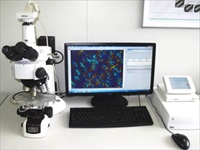
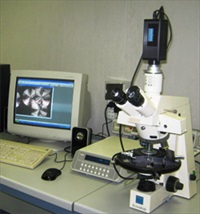 A group of scientists from the CNR is investigating the melting kinetics of poly(3-hydroxybutyrate) (PHB), a natural thermoplastic polymer with mechanical properties comparable to synthetic polymers. PHB is now the focus of scientific interest as it has commercial potential as a fully biodegradable and biocompatible product. Potential uses include environmentally friendly packaging and films, pharmaceutical drug administration, and biocompatible resorbable medical implants. Small batches of PHB have been produced since 1925 by bacterial fermentation, but until now there is no large scale commercial production because it is more expensive than commonly used polymers...
A group of scientists from the CNR is investigating the melting kinetics of poly(3-hydroxybutyrate) (PHB), a natural thermoplastic polymer with mechanical properties comparable to synthetic polymers. PHB is now the focus of scientific interest as it has commercial potential as a fully biodegradable and biocompatible product. Potential uses include environmentally friendly packaging and films, pharmaceutical drug administration, and biocompatible resorbable medical implants. Small batches of PHB have been produced since 1925 by bacterial fermentation, but until now there is no large scale commercial production because it is more expensive than commonly used polymers...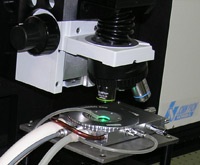 Founded in 1982, the Institute of Earth Sciences (IES) conducts research in two major disciplines: geophysics and geochemistry. The mineral and rock physics laboratory in the IES is one of the most prominent labs in mineral physics in Taiwan. It is one of nearly 30 institutes and centres that form the Academia Sinica (AS), the main governmental organization for basic research in all academic disciplines in Taiwan. Recent research has included mantle dynamics modelling, heat flow and space remote sensing...
Founded in 1982, the Institute of Earth Sciences (IES) conducts research in two major disciplines: geophysics and geochemistry. The mineral and rock physics laboratory in the IES is one of the most prominent labs in mineral physics in Taiwan. It is one of nearly 30 institutes and centres that form the Academia Sinica (AS), the main governmental organization for basic research in all academic disciplines in Taiwan. Recent research has included mantle dynamics modelling, heat flow and space remote sensing...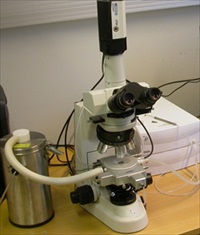 Founded in 1886, the Geological Survey of Finland (GTK) was created to promote the systematic and sustainable use of the Earth's resources through the production and dissemination of geological information to society. The GTK is Finland's national geoscientific information centre and it participates actively in international research and project work, with the areas of focus falling into three main categories: mineral resources and exploration; energy supply and environment; and land use and construction...
Founded in 1886, the Geological Survey of Finland (GTK) was created to promote the systematic and sustainable use of the Earth's resources through the production and dissemination of geological information to society. The GTK is Finland's national geoscientific information centre and it participates actively in international research and project work, with the areas of focus falling into three main categories: mineral resources and exploration; energy supply and environment; and land use and construction...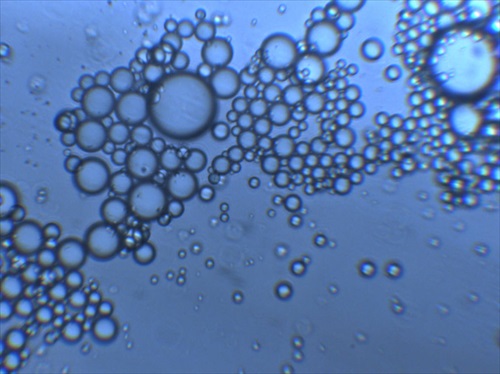 Liquid-crystalline polymers (LCPs) are materials with exceptionally useful mechanical properties compared with ordinary industrial polymers. LCPs are not frequently used in industry due to their prohibitive production costs, but blending an LCP with a relatively common polymer is one way to utilize them at a reduced cost. Only blends that fibrillate in situ during processing, and when the fibrils maintain a solid state, do they demonstrate these superior properties...
Liquid-crystalline polymers (LCPs) are materials with exceptionally useful mechanical properties compared with ordinary industrial polymers. LCPs are not frequently used in industry due to their prohibitive production costs, but blending an LCP with a relatively common polymer is one way to utilize them at a reduced cost. Only blends that fibrillate in situ during processing, and when the fibrils maintain a solid state, do they demonstrate these superior properties...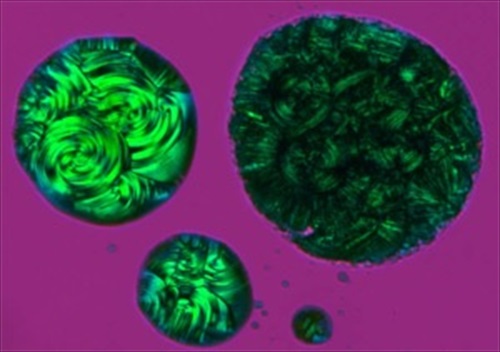 Researchers in the physical chemistry department of the University of the Orange Free State (UFS) have examined the discotic liquid crystal properties of a number of long chain metal free and zinc phthalocyanines using the Linkam THMS600 hot stage. Phthalocyanines are aromatic compounds, with a variable length carbon chain, produced when the phthalocyanine molecule reacts with metals to form brightly colored complexes. These metal and non-metal derivatives are used for many applications, with new uses being continuously developed. They are found in dyes, chemical sensors, catalysts, non-linear optical materials and have been used for photodynamic cancer treatments....
Researchers in the physical chemistry department of the University of the Orange Free State (UFS) have examined the discotic liquid crystal properties of a number of long chain metal free and zinc phthalocyanines using the Linkam THMS600 hot stage. Phthalocyanines are aromatic compounds, with a variable length carbon chain, produced when the phthalocyanine molecule reacts with metals to form brightly colored complexes. These metal and non-metal derivatives are used for many applications, with new uses being continuously developed. They are found in dyes, chemical sensors, catalysts, non-linear optical materials and have been used for photodynamic cancer treatments....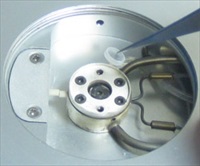 A group of scientists from the University of South Carolina (USC) and Shanghai Jiao Tong University are working on a jointly funded doctorial training programme, based at USC, investigating ways of using cell microencapsulation to protect cells from the undesired immune response known as immunoisolation. For this work, they have used Linkam's temperature stages, the FDCS196 and DSC600.
A group of scientists from the University of South Carolina (USC) and Shanghai Jiao Tong University are working on a jointly funded doctorial training programme, based at USC, investigating ways of using cell microencapsulation to protect cells from the undesired immune response known as immunoisolation. For this work, they have used Linkam's temperature stages, the FDCS196 and DSC600.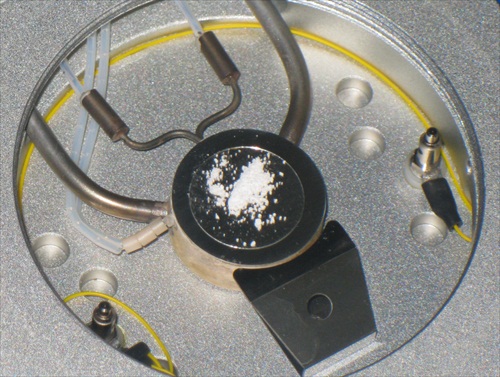 Birefringence, a property of a crystalline material describes how within the material there are two distinct indices of refraction. This feature is associated with uniaxial crystals (hexagonal, tetragonal, and trigonal systems). This can be described as the optic axis running along the x-axis of the crystal and the o-wave perpendicular to the x-axis. Birefringent materials are used to create polarising filters or interference colours. Some familiar birefringent materials include tourmaline, calcite, quartz, ice, and barium titanate (BaTiO3)...
Birefringence, a property of a crystalline material describes how within the material there are two distinct indices of refraction. This feature is associated with uniaxial crystals (hexagonal, tetragonal, and trigonal systems). This can be described as the optic axis running along the x-axis of the crystal and the o-wave perpendicular to the x-axis. Birefringent materials are used to create polarising filters or interference colours. Some familiar birefringent materials include tourmaline, calcite, quartz, ice, and barium titanate (BaTiO3)...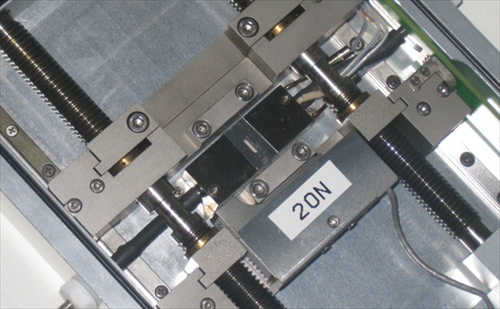
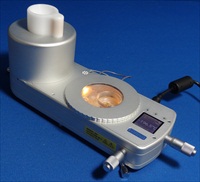 Linkam are pleased to announce the development and launch of a stage for cryo-correlative light/electron microscopy (cryo-CLEM). It was designed in collaboration with scientists at the Leiden University Medical Centre (LUMC) led by Bram Koster and Erik Bos. Cryo-CLEM is the correlation of images captured with a cryostage on a fluorescent light microscope and images of the same sample observed with Transmission Electron Microscopy (TEM)...
Linkam are pleased to announce the development and launch of a stage for cryo-correlative light/electron microscopy (cryo-CLEM). It was designed in collaboration with scientists at the Leiden University Medical Centre (LUMC) led by Bram Koster and Erik Bos. Cryo-CLEM is the correlation of images captured with a cryostage on a fluorescent light microscope and images of the same sample observed with Transmission Electron Microscopy (TEM)...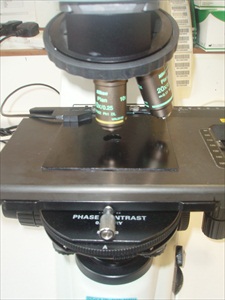 The concentration, motility and morphology of sperm are universal indicators of fertility- regardless of whether the male is human or an animal. Fertility is a big health issue within the UK: about 25% of couples are affected by fertility problems, with around 35% of men sub-fertile and 2% infertile. Many NHS hospitals and private labs offer fertility testing to couples and for men that means assessment of a semen sample.
The concentration, motility and morphology of sperm are universal indicators of fertility- regardless of whether the male is human or an animal. Fertility is a big health issue within the UK: about 25% of couples are affected by fertility problems, with around 35% of men sub-fertile and 2% infertile. Many NHS hospitals and private labs offer fertility testing to couples and for men that means assessment of a semen sample.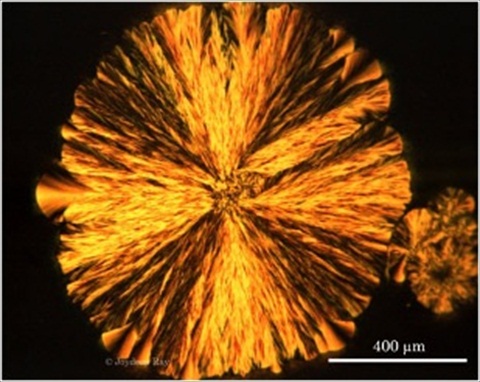 Reformulation is a common area of study for food scientists, as worldwide, many universities and private organisations are investing heavily in research to create healthier versions of popular foods. Reformulation is the process of adding or taking away ingredients from an established recipe. This is challenging as many of the chemical processes that occur within the foods are unknown and changing a specific constituent can have consequences on health and safety, cooking, storage and on manufacturing processes...
Reformulation is a common area of study for food scientists, as worldwide, many universities and private organisations are investing heavily in research to create healthier versions of popular foods. Reformulation is the process of adding or taking away ingredients from an established recipe. This is challenging as many of the chemical processes that occur within the foods are unknown and changing a specific constituent can have consequences on health and safety, cooking, storage and on manufacturing processes...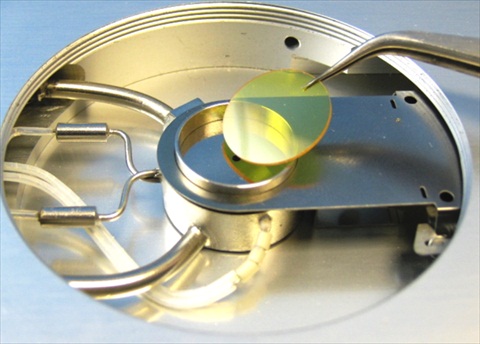 Geologists are interested in the distribution of volatile constituents across mineral crystals as this can provide insight into the crystallization process. This is now possible to investigate using modern FTIR imaging capabilities. On the Earth's crust, water bearing minerals are common. How these minerals dehydrate is important as this can give clues about dehydration-induced earthquakes and phase transformations at non-ambient conditions...
Geologists are interested in the distribution of volatile constituents across mineral crystals as this can provide insight into the crystallization process. This is now possible to investigate using modern FTIR imaging capabilities. On the Earth's crust, water bearing minerals are common. How these minerals dehydrate is important as this can give clues about dehydration-induced earthquakes and phase transformations at non-ambient conditions...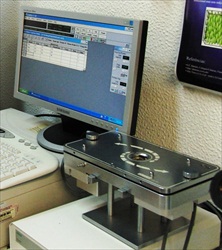 CENIMAT is a national scientific research center sponsored by the Portuguese Ministry of Science, Technology and Higher Education. It is divided into four Research Teams: Dielectrics Materials and Structures Group, Electronics and Microelectronics Materials Group, Polymeric and Mesomorphic Materials Group and Structural Materials Group.
CENIMAT is a national scientific research center sponsored by the Portuguese Ministry of Science, Technology and Higher Education. It is divided into four Research Teams: Dielectrics Materials and Structures Group, Electronics and Microelectronics Materials Group, Polymeric and Mesomorphic Materials Group and Structural Materials Group.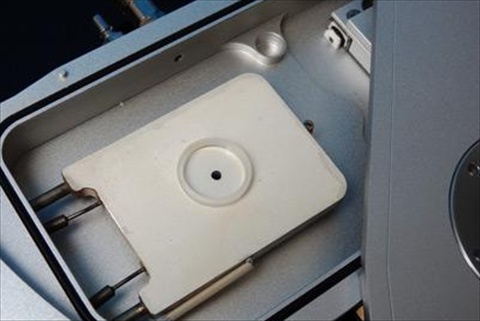 The Institute for Particle Science and Engineering is a centre of excellence within the School of Process, Environmental and Materials Engineering at the University of Leeds. Researchers here focus on projects that address the engineering science of particulate processes and products. PhD and MSc students have been using an LTS350 hot-stage system in their research for several years...
The Institute for Particle Science and Engineering is a centre of excellence within the School of Process, Environmental and Materials Engineering at the University of Leeds. Researchers here focus on projects that address the engineering science of particulate processes and products. PhD and MSc students have been using an LTS350 hot-stage system in their research for several years...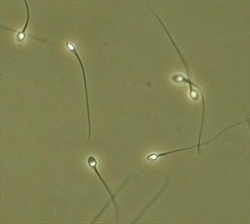 Market leaders in temperature controlled microscopy, Linkam Scientific Instruments, have been chosen by an NHS Fertility clinic as suppliers of a controlled warm stage to perform routine semen analysis at body temperature. A Scottish NHS laboratory has chosen a Linkam THL60-16 warm stage as a reliable solution for the assessment of sperm motility...
Market leaders in temperature controlled microscopy, Linkam Scientific Instruments, have been chosen by an NHS Fertility clinic as suppliers of a controlled warm stage to perform routine semen analysis at body temperature. A Scottish NHS laboratory has chosen a Linkam THL60-16 warm stage as a reliable solution for the assessment of sperm motility...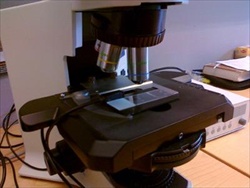 Market leaders in temperature controlled microscopy, Linkam Scientific Instruments report on the use of their TH60-6 warm stage to study bird hybridization at the Department of Ecology and Genetics, Uppsala, Sweden. At the Evolutionary Biology Centre, Department of Ecology and Genetics/Animal Ecology at Uppsala University, PhD student, Murielle Podevin, is studying two species of birds; the collared and the pied flycatcher. These species started to diverge approximately 2 million years ago and have separate distributions in Europe but breed in common areas on two islands in the Baltic Sea...
Market leaders in temperature controlled microscopy, Linkam Scientific Instruments report on the use of their TH60-6 warm stage to study bird hybridization at the Department of Ecology and Genetics, Uppsala, Sweden. At the Evolutionary Biology Centre, Department of Ecology and Genetics/Animal Ecology at Uppsala University, PhD student, Murielle Podevin, is studying two species of birds; the collared and the pied flycatcher. These species started to diverge approximately 2 million years ago and have separate distributions in Europe but breed in common areas on two islands in the Baltic Sea...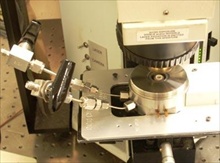 Market leaders in temperature controlled microscopy, Linkam Scientific Instruments report on the use of their CCR1000 as a mini reactor (in-situ Raman cell) at the University of South Carolina...
Market leaders in temperature controlled microscopy, Linkam Scientific Instruments report on the use of their CCR1000 as a mini reactor (in-situ Raman cell) at the University of South Carolina...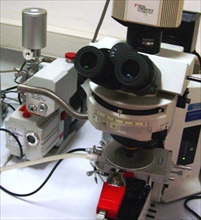 Market leaders in temperature controlled microscopy, Linkam Scientific Instruments, have been chosen by Pontificia Universidad Católica de Chile to supply a THMS350V stage to understand the frying of starch in oil and water...
Market leaders in temperature controlled microscopy, Linkam Scientific Instruments, have been chosen by Pontificia Universidad Católica de Chile to supply a THMS350V stage to understand the frying of starch in oil and water...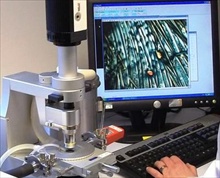 Market leaders in temperature controlled microscopy, Linkam Scientific Instruments report on the use of their THMS600 temperature stage as part of a system from Biopharma Technology Limited (BTL) to characterize freeze drying processes at the University of Iowa...
Market leaders in temperature controlled microscopy, Linkam Scientific Instruments report on the use of their THMS600 temperature stage as part of a system from Biopharma Technology Limited (BTL) to characterize freeze drying processes at the University of Iowa...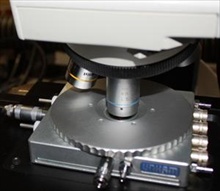 Market leaders in temperature controlled microscopy, Linkam Scientific Instruments, report on the work of Dr Sharath Sriram, a Research Fellow at RMIT University in Melbourne, Australia. He uses Linkam specialist temperature stages with micro-Raman spectroscopy systems to investigate temperature dependent spectral measurements...
Market leaders in temperature controlled microscopy, Linkam Scientific Instruments, report on the work of Dr Sharath Sriram, a Research Fellow at RMIT University in Melbourne, Australia. He uses Linkam specialist temperature stages with micro-Raman spectroscopy systems to investigate temperature dependent spectral measurements...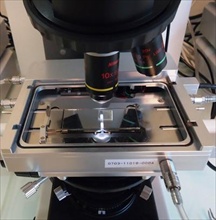 Market leaders in temperature controlled microscopy, Linkam Scientific Instruments, report on the work of Professor Yves Henri Geerts from the Université Libre de Bruxelles where he uses a specially designed temperature stage to study crystallisation processes in opto-electronic thin films...
Market leaders in temperature controlled microscopy, Linkam Scientific Instruments, report on the work of Professor Yves Henri Geerts from the Université Libre de Bruxelles where he uses a specially designed temperature stage to study crystallisation processes in opto-electronic thin films...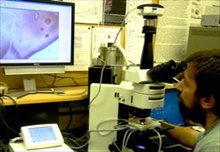 Market leaders in temperature controlled microscopy, Linkam Scientific Instruments report the use of their 1400°C high temperature stage to study silicate melt inclusions in the Fluids Research Group of the Geosciences Department at Virginia Tech. Researchers in the Fluids Research Group at Virginia Tech are concerned with the distribution, properties and role of fluids in and on the Earth, from its surface (shallow Earth's crust) to its deep interior (Earth's mantle)...
Market leaders in temperature controlled microscopy, Linkam Scientific Instruments report the use of their 1400°C high temperature stage to study silicate melt inclusions in the Fluids Research Group of the Geosciences Department at Virginia Tech. Researchers in the Fluids Research Group at Virginia Tech are concerned with the distribution, properties and role of fluids in and on the Earth, from its surface (shallow Earth's crust) to its deep interior (Earth's mantle)...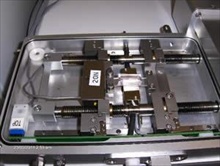 Market leaders in temperature controlled microscopy, Linkam Scientific Instruments, have been chosen by the Physics Department of the University of Liverpool to study the effects of controlling stresses applied during the growth of collagen secreted from human fibroblast cells The research goal of Senior Research Assistant, Dr Caroline Smith, and her colleagues at the University of Liverpool is to advance the treatment of tendon injuries by developing a method of growing oriented human collagen....
Market leaders in temperature controlled microscopy, Linkam Scientific Instruments, have been chosen by the Physics Department of the University of Liverpool to study the effects of controlling stresses applied during the growth of collagen secreted from human fibroblast cells The research goal of Senior Research Assistant, Dr Caroline Smith, and her colleagues at the University of Liverpool is to advance the treatment of tendon injuries by developing a method of growing oriented human collagen....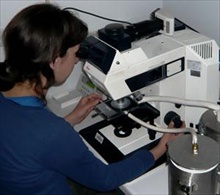 Market leaders in temperature controlled microscopy, Linkam Scientific Instruments announce the use of their THMS600 temperature stage at the Leiden University Medical Center to aid the cryo-study of biological specimens. Professor A.J. Koster (Leiden University Medical Center) is one of the founders of NeCEN, the Netherlands Center of Electron Nanoscopy which was formed to advance cryo-TEM in the Netherlands...
Market leaders in temperature controlled microscopy, Linkam Scientific Instruments announce the use of their THMS600 temperature stage at the Leiden University Medical Center to aid the cryo-study of biological specimens. Professor A.J. Koster (Leiden University Medical Center) is one of the founders of NeCEN, the Netherlands Center of Electron Nanoscopy which was formed to advance cryo-TEM in the Netherlands...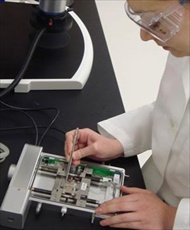 Market leaders in temperature controlled microscopy, Linkam Scientific Instruments announce the use of their temperature controlled tensile stage by the Mather Group at Syracuse University. Patrick Mather is Professor of Biomedical and Chemical Engineering at Syracuse University. His research group focuses on functional materials: in particular, the development of polymeric and hybrid materials with prescribed functionality beyond traditionally passive mechanical roles...
Market leaders in temperature controlled microscopy, Linkam Scientific Instruments announce the use of their temperature controlled tensile stage by the Mather Group at Syracuse University. Patrick Mather is Professor of Biomedical and Chemical Engineering at Syracuse University. His research group focuses on functional materials: in particular, the development of polymeric and hybrid materials with prescribed functionality beyond traditionally passive mechanical roles...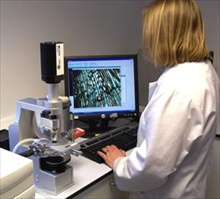 Market leaders in temperature controlled microscopy, Linkam Scientific Instruments, and freeze drying technology, Biopharma Technology Limited, celebrate ten years of partnership in supplying solutions to the pharmaceutical industry.
Market leaders in temperature controlled microscopy, Linkam Scientific Instruments, and freeze drying technology, Biopharma Technology Limited, celebrate ten years of partnership in supplying solutions to the pharmaceutical industry.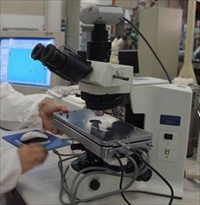 Market leaders in temperature controlled microscopy, Linkam Scientific Instruments, have been chosen by the Polymer Technology Group of the Dep. of Chemical and Food Engineering of the University of Salerno as suppliers of a controlled shear system to study the effect of temperature and steady shear flow on the nucleation rate of spherulites in isotactic polypropylene.
Market leaders in temperature controlled microscopy, Linkam Scientific Instruments, have been chosen by the Polymer Technology Group of the Dep. of Chemical and Food Engineering of the University of Salerno as suppliers of a controlled shear system to study the effect of temperature and steady shear flow on the nucleation rate of spherulites in isotactic polypropylene.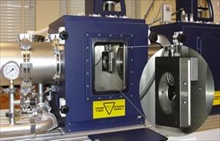 Market leaders in temperature controlled microscopy, Linkam Scientific Instruments, have been chosen by the Chemistry Department of the University of Manitoba to characterize liquid crystal composites conjunction with SAXS.
Market leaders in temperature controlled microscopy, Linkam Scientific Instruments, have been chosen by the Chemistry Department of the University of Manitoba to characterize liquid crystal composites conjunction with SAXS.